Descriptive Essay Writing

Descriptive Essay Examples

Amazing Descriptive Essay Examples for Your Help
Published on: Jun 21, 2023
Last updated on: Mar 1, 2024
-8521.jpg)
People also read
Interesting Descriptive Essay Topics - 2024
Writing a Descriptive Essay Outline - Tips & Examples
Descriptive Essay: Definition, Tips & Examples
Share this article
Descriptive essays are very commonly assigned essays. This type of essay enhances students' writing skills and allows them to think critically.
A descriptive essay is often referred to as the parent essay type. Other essays like argumentative essays, narrative essays, and expository essays fall into descriptive essays. Also, this essay helps the student enhance their ability to imagine the whole scene in mind by appealing senses.
It is assigned to high school students and all other students at different academic levels. Students make use of the human senses like touch, smell, etc., to make the descriptive essay more engaging for the readers.
On This Page On This Page -->
Examples make it easy for readers to understand things in a better way. Also, in a descriptive essay, different types of descriptions can be discussed.
Here are some amazing examples of a descriptive essay to make the concept easier for you.
Descriptive Essay Example 5 Paragraph
5 paragraphs essay writing format is the most common method of composing an essay. This format has 5 paragraphs in total. The sequence of the paragraphs is as follows;
- Introduction
- Body Paragraph 1
- Body Paragraph 2
- Body Paragraph 3
- Conclusion
Following is an example of a descriptive essay written using the famous 5 paragraph method.
5 Paragraph Descriptive Essay

Get More Examples From Our AI Essay Writer
Descriptive Essay Example About A Person
Descriptive essays are the best option when it comes to describing and writing about a person. A descriptive essay is written using the five human senses. It helps in creating a vivid image in the readerâs mind and understanding what the writer is trying to convey.
Here is one of the best descriptive essay examples about a person. Read it thoroughly and try to understand how a good descriptive essay is written on someoneâs personality.
Descriptive Essay Example About a Person
Descriptive Essay Example About A Place
If you have visited a good holiday spot or any other place and want to let your friends know about it. A descriptive essay can help you explain every detail and moment you had at that place.
Here is one of the good descriptive essay examples about a place. Use it as a sample and learn how you can write such an essay.

Tough Essay Due? Hire Tough Writers!
Descriptive Essay Example for Grade 6
Descriptive essays are frequently assigned to school students. This type of essay helps the students enhance their writing skills and helps them see things in a more analytical way.
If you are a 6 grader and looking for a good descriptive essay example, you are in the right place.
Descriptive Essay Example for Grade 7
Here is one of the best descriptive essay examples for grade 7.
Descriptive Essay Example for Grade 8
If you are looking for some amazing descriptive essay examples for grade 8, you have already found one. Look at the given example and see what a well-written descriptive essay looks like.
Descriptive Essay Example for Grade 10
Essay writing is an inevitable part of a student's academic life . No matter your grade, you will get to write some sort of essay at least once.
Here is an example of a descriptive essay writing for grade10. If you are also a student of this grade, this example might help you to complete your assignment.
Descriptive Essay Example for Grade 12
If you are a senior student and looking for some essay examples, you are exactly where you should be.
Use the below-mentioned example and learn how to write a good essay according to the instructions given to you.
Descriptive Essay Example College
Descriptive essays are a great way to teach students how they can become better writers. Writing a descriptive essay encourages them to see the world more analytically.
Below is an example that will help you and make your writing process easy.
College Descriptive Essay Example
Descriptive Essay Example for University
Descriptive essays are assigned to students at all academic levels. University students are also assigned descriptive essay writing assignments. As they are students of higher educational levels, they are often given a bit of difficult and more descriptive topics.
See the example below and know what a descriptive essay at the university level looks like.
Short Descriptive Essay Example
Every time a descriptive essay isn't written in detail. It depends on the topic of how long the essay will be.
For instance, look at one of the short descriptive essay examples given below. See how the writer has conveyed the concept in a composed way.
Objective Descriptive Essay Example
When writing an objective description essay, you focus on describing the object without conveying your emotions, feelings, or personal reactions. The writer uses sight, sound, or touch for readers' minds to bring life into pictures that were painted by words.
Here is an example that you can use for your help.
Narrative and Descriptive Essay Example
A narrative descriptive essay can be a great way to share your experiences with others. It is a story that teaches a lesson you have learned. The following is an example of a perfect narrative descriptive essay to help you get started.
Paper Due? Why Suffer? That's our Job!
How to Start a Descriptive Essay? - Example
If you don't know how to start your descriptive essay, check this example and create a perfect one.
How to Start a Descriptive Essay - Example
Subjective Descriptive Essay Example
It is a common concept that a descriptive essay revolves around one subject. Be it a place, person, event, or any other object you can think of.
Following is one of the subjective descriptive, easy examples. Use it as a guide to writing an effective descriptive essay yourself.
Writing a descriptive essay is a time-consuming yet tricky task. It needs some very strong writing, analytical, and critical thinking skills. Also, this is a type of essay that a student can not avoid and bypass.
But if you think wisely, work smart, and stay calm, you can get over it easily. Learn how to write a descriptive essay from a short guide given below.
How to Write a Descriptive Essay?
A writer writes a descriptive essay from their knowledge and imaginative mind. In this essay, the writer describes what he has seen or experienced, or ever heard from someone. For a descriptive essay, it is important to stay focused on one point. Also, the writer should use figurative language so that the reader can imagine the situation in mind.
The following are some very basic yet important steps that can help you write an amazing descriptive essay easily.
- Choose a Topic
For a descriptive essay, you must choose a vast topic to allow you to express yourself freely. Also, make sure that the topic you choose is not overdone. An overdone will not grab the attention of your intended audience. Check out our descriptive essay topics blog for a variety of intriguing topic suggestions.
- Create a Strong Thesis Statement
A thesis statement is the essence of any academic writing. When you select the descriptive essay topic, then you create a strong thesis statement for your essay.
A thesis statement is a sentence or two that explains the whole idea of your essay to the reader. It is stated in the introductory paragraph of the essay. The word choice for creating the thesis statement must be very expressive, composed, and meaningful. Also, use vivid language for the thesis statement.
- Collect the Necessary Information
Once you have created the thesis statement and are done writing your essay introduction . Now, it's time to move toward the body paragraphs.
Collect all necessary information related to your topic. You would be adding this information to your essay to support your thesis statement. Make sure that you collect information from authentic sources.
To enhance your essay, make use of some adjectives and adverbs. To make your descriptive essay more vivid, try to incorporate sensory details like touch, taste, sight, and smell.
- Create a Descriptive Essay Outline
An outline is yet another necessary element of your college essay. By reading the descriptive essay outline , the reader feels a sense of logic and a guide for the essay.
In the outline, you need to write an introduction, thesis statement, body paragraphs and end up with a formal conclusion.
Proofreading is a simple procedure in which the writer revises the written essay. This is done in order to rectify the document for any kind of spelling or grammatical mistakes. Thus, proofreading makes high-quality content and gives a professional touch to it.
You might be uncertain about writing a good enough descriptive essay and impress your teacher. However, it is very common, so you do not need to stress out.
Hit us up at CollegeEssay.org and get an essay written by our professional descriptive essay writers. Our essay writing service for students aims to help clients in every way possible and ease their stress. Get in touch with our customer support team, and they will take care of all your queries related to your writing.
You can always enhance your writing skills by leveraging the power of our AI essay writing tools .
Place your order now and let all your stress go away in a blink!
Barbara P (Literature)
Barbara is a highly educated and qualified author with a Ph.D. in public health from an Ivy League university. She has spent a significant amount of time working in the medical field, conducting a thorough study on a variety of health issues. Her work has been published in several major publications.
Paper Due? Why Suffer? That’s our Job!

Keep reading

- Privacy Policy
- Cookies Policy
- Terms of Use
- Refunds & Cancellations
- Our Writers
- Success Stories
- Our Guarantees
- Affiliate Program
- Referral Program
- AI Essay Writer
Disclaimer: All client orders are completed by our team of highly qualified human writers. The essays and papers provided by us are not to be used for submission but rather as learning models only.

- Board of Trustees
- Dialogue Group
- District Steering Committee
- Management of the NECT
- From the CEOs desk
- NECT and sector documents
- Dialogues, seminars and summits
- Annual Reports
- Technical Reports
- Case studies
- Special Reports
- For teachers
- For parents
- Messages to Schools and Parents
- KwaZulu Natal
- Eastern Cape
GRADE 5 EFAL DESCRIPTIVE ESSAY WRITING EXEMPLAR.pdf

Have a language expert improve your writing
Run a free plagiarism check in 10 minutes, generate accurate citations for free.
- Knowledge Base
- How to write a descriptive essay | Example & tips
How to Write a Descriptive Essay | Example & Tips
Published on July 30, 2020 by Jack Caulfield . Revised on August 14, 2023.
A descriptive essay gives a vivid, detailed description of something—generally a place or object, but possibly something more abstract like an emotion. This type of essay , like the narrative essay , is more creative than most academic writing .
Instantly correct all language mistakes in your text
Upload your document to correct all your mistakes in minutes

Table of contents
Descriptive essay topics, tips for writing descriptively, descriptive essay example, other interesting articles, frequently asked questions about descriptive essays.
When you are assigned a descriptive essay, you’ll normally be given a specific prompt or choice of prompts. They will often ask you to describe something from your own experience.
- Describe a place you love to spend time in.
- Describe an object that has sentimental value for you.
You might also be asked to describe something outside your own experience, in which case you’ll have to use your imagination.
- Describe the experience of a soldier in the trenches of World War I.
- Describe what it might be like to live on another planet.
Sometimes you’ll be asked to describe something more abstract, like an emotion.
If you’re not given a specific prompt, try to think of something you feel confident describing in detail. Think of objects and places you know well, that provoke specific feelings or sensations, and that you can describe in an interesting way.
Receive feedback on language, structure, and formatting
Professional editors proofread and edit your paper by focusing on:
- Academic style
- Vague sentences
- Style consistency
See an example

The key to writing an effective descriptive essay is to find ways of bringing your subject to life for the reader. You’re not limited to providing a literal description as you would be in more formal essay types.
Make use of figurative language, sensory details, and strong word choices to create a memorable description.
Use figurative language
Figurative language consists of devices like metaphor and simile that use words in non-literal ways to create a memorable effect. This is essential in a descriptive essay; it’s what gives your writing its creative edge and makes your description unique.
Take the following description of a park.
This tells us something about the place, but it’s a bit too literal and not likely to be memorable.
If we want to make the description more likely to stick in the reader’s mind, we can use some figurative language.
Here we have used a simile to compare the park to a face and the trees to facial hair. This is memorable because it’s not what the reader expects; it makes them look at the park from a different angle.
You don’t have to fill every sentence with figurative language, but using these devices in an original way at various points throughout your essay will keep the reader engaged and convey your unique perspective on your subject.
Use your senses
Another key aspect of descriptive writing is the use of sensory details. This means referring not only to what something looks like, but also to smell, sound, touch, and taste.
Obviously not all senses will apply to every subject, but it’s always a good idea to explore what’s interesting about your subject beyond just what it looks like.
Even when your subject is more abstract, you might find a way to incorporate the senses more metaphorically, as in this descriptive essay about fear.
Choose the right words
Writing descriptively involves choosing your words carefully. The use of effective adjectives is important, but so is your choice of adverbs , verbs , and even nouns.
It’s easy to end up using clichéd phrases—“cold as ice,” “free as a bird”—but try to reflect further and make more precise, original word choices. Clichés provide conventional ways of describing things, but they don’t tell the reader anything about your unique perspective on what you’re describing.
Try looking over your sentences to find places where a different word would convey your impression more precisely or vividly. Using a thesaurus can help you find alternative word choices.
- My cat runs across the garden quickly and jumps onto the fence to watch it from above.
- My cat crosses the garden nimbly and leaps onto the fence to survey it from above.
However, exercise care in your choices; don’t just look for the most impressive-looking synonym you can find for every word. Overuse of a thesaurus can result in ridiculous sentences like this one:
- My feline perambulates the allotment proficiently and capers atop the palisade to regard it from aloft.
An example of a short descriptive essay, written in response to the prompt “Describe a place you love to spend time in,” is shown below.
Hover over different parts of the text to see how a descriptive essay works.
On Sunday afternoons I like to spend my time in the garden behind my house. The garden is narrow but long, a corridor of green extending from the back of the house, and I sit on a lawn chair at the far end to read and relax. I am in my small peaceful paradise: the shade of the tree, the feel of the grass on my feet, the gentle activity of the fish in the pond beside me.
My cat crosses the garden nimbly and leaps onto the fence to survey it from above. From his perch he can watch over his little kingdom and keep an eye on the neighbours. He does this until the barking of next door’s dog scares him from his post and he bolts for the cat flap to govern from the safety of the kitchen.
With that, I am left alone with the fish, whose whole world is the pond by my feet. The fish explore the pond every day as if for the first time, prodding and inspecting every stone. I sometimes feel the same about sitting here in the garden; I know the place better than anyone, but whenever I return I still feel compelled to pay attention to all its details and novelties—a new bird perched in the tree, the growth of the grass, and the movement of the insects it shelters…
Sitting out in the garden, I feel serene. I feel at home. And yet I always feel there is more to discover. The bounds of my garden may be small, but there is a whole world contained within it, and it is one I will never get tired of inhabiting.
If you want to know more about AI tools , college essays , or fallacies make sure to check out some of our other articles with explanations and examples or go directly to our tools!
- Ad hominem fallacy
- Post hoc fallacy
- Appeal to authority fallacy
- False cause fallacy
- Sunk cost fallacy
College essays
- Choosing Essay Topic
- Write a College Essay
- Write a Diversity Essay
- College Essay Format & Structure
- Comparing and Contrasting in an Essay
(AI) Tools
- Grammar Checker
- Paraphrasing Tool
- Text Summarizer
- AI Detector
- Plagiarism Checker
- Citation Generator
Here's why students love Scribbr's proofreading services
Discover proofreading & editing
The key difference is that a narrative essay is designed to tell a complete story, while a descriptive essay is meant to convey an intense description of a particular place, object, or concept.
Narrative and descriptive essays both allow you to write more personally and creatively than other kinds of essays , and similar writing skills can apply to both.
If you’re not given a specific prompt for your descriptive essay , think about places and objects you know well, that you can think of interesting ways to describe, or that have strong personal significance for you.
The best kind of object for a descriptive essay is one specific enough that you can describe its particular features in detail—don’t choose something too vague or general.
Cite this Scribbr article
If you want to cite this source, you can copy and paste the citation or click the “Cite this Scribbr article” button to automatically add the citation to our free Citation Generator.
Caulfield, J. (2023, August 14). How to Write a Descriptive Essay | Example & Tips. Scribbr. Retrieved March 31, 2024, from https://www.scribbr.com/academic-essay/descriptive-essay/
Is this article helpful?

Jack Caulfield
Other students also liked, how to write a narrative essay | example & tips, how to write a literary analysis essay | a step-by-step guide, how to write an expository essay, unlimited academic ai-proofreading.
✔ Document error-free in 5minutes ✔ Unlimited document corrections ✔ Specialized in correcting academic texts
- Try for free
Writing a Descriptive Paragraph (Gr. 5)

Must-have graphic organizer for middle-school writing lessons!

Scott Foresman, an imprint of Pearson
Featured 5th grade resources.

Related Resources
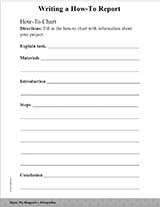
- PRO Courses Guides New Tech Help Pro Expert Videos About wikiHow Pro Upgrade Sign In
- EDIT Edit this Article
- EXPLORE Tech Help Pro About Us Random Article Quizzes Request a New Article Community Dashboard This Or That Game Popular Categories Arts and Entertainment Artwork Books Movies Computers and Electronics Computers Phone Skills Technology Hacks Health Men's Health Mental Health Women's Health Relationships Dating Love Relationship Issues Hobbies and Crafts Crafts Drawing Games Education & Communication Communication Skills Personal Development Studying Personal Care and Style Fashion Hair Care Personal Hygiene Youth Personal Care School Stuff Dating All Categories Arts and Entertainment Finance and Business Home and Garden Relationship Quizzes Cars & Other Vehicles Food and Entertaining Personal Care and Style Sports and Fitness Computers and Electronics Health Pets and Animals Travel Education & Communication Hobbies and Crafts Philosophy and Religion Work World Family Life Holidays and Traditions Relationships Youth
- Browse Articles
- Learn Something New
- Quizzes Hot
- This Or That Game New
- Train Your Brain
- Explore More
- Support wikiHow
- About wikiHow
- Log in / Sign up
- Education and Communications
- College University and Postgraduate
- Academic Writing
How to Write a Descriptive Essay
Last Updated: February 24, 2024 Fact Checked
This article was co-authored by Jake Adams . Jake Adams is an academic tutor and the owner of Simplifi EDU, a Santa Monica, California based online tutoring business offering learning resources and online tutors for academic subjects K-College, SAT & ACT prep, and college admissions applications. With over 14 years of professional tutoring experience, Jake is dedicated to providing his clients the very best online tutoring experience and access to a network of excellent undergraduate and graduate-level tutors from top colleges all over the nation. Jake holds a BS in International Business and Marketing from Pepperdine University. This article has been fact-checked, ensuring the accuracy of any cited facts and confirming the authority of its sources. This article has been viewed 1,513,493 times.
A good descriptive essay creates a vivid picture of the topic in the reader’s mind. You may need to write a descriptive essay as a class assignment or you may decide to write one as a fun writing challenge. Start by brainstorming ideas for the essay. Then, outline and write the essay using vivid sensory details and strong descriptions. Always polish your essay and proofread it so it is at its best.
Brainstorming Ideas for the Essay

- You could also choose a fictional person to write about, such as a character in a book, a story, or a play. You could write about a character on your favorite TV show or video game.

- Another take on this option is to write about a made-up place or object, such as the fantastical school in your favorite book or the magic wand from your favorite TV show.

- You could also choose a more specific emotion, such as brotherly love or self-hatred. These emotions can make for powerful descriptive essays.

- For example, if you were writing about a person like your mother, you may write down under “sound” : “soft voice at night, clack of her shoes on the floor tiles, bang of the spoon when she cooks.”
Writing the Essay

- If you are writing the essay for a class, your instructor should specify if they want a five paragraph essay or if you have the freedom to use sections instead.

- For example, if you were writing a descriptive essay about your mother, you may have a thesis statement like: “In many ways, my mother is the reigning queen of our house, full of contradictions that we are too afraid to question.”

- For example, if you were writing the essay about your mom, you may start with: “My mother is not like other mothers. She is a fierce protector and a mysterious woman to my sisters and I.”
- If you were writing an essay about an object, you may start with: "Try as I might, I had a hard time keeping my pet rock alive."

- You can also use adjectives that connect to the senses, such “rotting,” “bright,” “hefty,” “rough,” and “pungent.”
- For example, you may describe your mother as "bright," "tough," and "scented with jasmine."

- You can also use similes, where you use “like” or “as” to compare one thing to another. For example, you may write, “My mother is like a fierce warrior in battle, if the battlefield were PTA meetings and the checkout line at the grocery store.”

- For example, you may write about your complicated feelings about your mother. You may note that you feel sadness about your mother’s sacrifices for the family and joy for the privileges you have in your life because of her.

- For example, you may end a descriptive essay about your mother by noting, “In all that she has sacrificed for us, I see her strength, courage, and fierce love for her family, traits I hope to emulate in my own life.”
Polishing the Essay

- You can also read the essay aloud to others to get their feedback. Ask them to let you know if there are any unclear or vague sentences in the essay.

- Be open to constructive criticism and feedback from others. This will only make your essay stronger.

- If you have a word count requirement for the essay, make sure you meet it. Add more detail to the paper or take unnecessary content out to reach the word count.
Outline for a Descriptive Essay

Expert Q&A

You Might Also Like

- ↑ https://www.writeexpress.com/descriptive-essay.html
- ↑ Jake Adams. Academic Tutor & Test Prep Specialist. Expert Interview. 24 July 2020.
- ↑ https://www.iup.edu/writingcenter/writing-resources/organization-and-structure/descriptive-writing.html
- ↑ https://spcollege.libguides.com/ld.php?content_id=10168248
- ↑ https://www.butte.edu/departments/cas/tipsheets/style_purpose_strategy/descriptive_essay.html
- ↑ https://owl.purdue.edu/owl/general_writing/academic_writing/essay_writing/descriptive_essays.html
About This Article

To write a descriptive essay, start by choosing a topic, like a person, place, or specific emotion. Next, write down a list of sensory details about the topic, like how it sounds, smells, and feels. After this brainstorming session, outline the essay, dividing it into an introduction, 3 body paragraphs, and a conclusion. Open with a vivid introduction that uses sensory details, then introduce your thesis statement, which the rest of your essay should support. Strengthen your essay further by using metaphors and similes to describe your topic, and the emotions it evokes. To learn how to put the finishing touches on your essay, keep reading! Did this summary help you? Yes No
- Send fan mail to authors
Reader Success Stories
Joshua Aigbe
Mar 25, 2021
Did this article help you?
Subaa Subaavarshini
Jul 13, 2020
Daniel Karibi
May 13, 2021
Aug 21, 2019

Featured Articles

Trending Articles

Watch Articles

- Terms of Use
- Privacy Policy
- Do Not Sell or Share My Info
- Not Selling Info
wikiHow Tech Help Pro:
Level up your tech skills and stay ahead of the curve
Descriptive Essay
Descriptive Essay Writing
Last updated on: Feb 9, 2023
How To Write An Impactful Descriptive Essay?
By: Cathy A.
12 min read
Reviewed By: Melisa C.
Published on: Dec 17, 2019

Wondering how to write an impressive descriptive essay? Writing a descriptive essay is both fun and challenging. You need to describe the main topic in detail and by engaging the five senses of the readers.
Students usually get this type of essay in high school and college. Writing a descriptive essay is different from other essays.
You need to focus on describing a certain person, place, or event.
Luckily for you, the following blog post will provide some helpful tips on how to create an engaging essay.
Continue reading to learn how to write an A-worthy descriptive essay.

On this Page
What is a Descriptive Essay?
A descriptive essay is a detailed paper that describes a place, person, situation, object, or emotion. Different people have different points of view and your job is to explain yours in detail.
You may be asked to write a descriptive essay about the beach or forest or about a person or situation. The purpose of this essay is to test the writer’s ability in expressing and explaining their experiences.
Descriptive writing should create a picture in the reader’s mind. You may be required to write a descriptive essay as a high school or college essay assignment.
For a compelling essay, using adjectives and adverbs, details, and figurative language is fundamental. Without proper usage of words, you will not be able to invoke the readers' emotions.
What is the Purpose of a Descriptive Essay?
The purpose of a descriptive essay is to describe a person, place, or personal experience in vivid detail so that the reader can create a picture in his mind.
The descriptive essay is written to get the reader to understand by using descriptive language. It is different from narrative essays, where the writer tells the story about someone else. Usually, it starts with a real-life event and then the content follows the author's imagination.
Descriptive essays are not intended to persuade the reader or show facts and figures to prove something. Descriptive essays are like word paintings that contain personal and descriptive details and these are mostly assigned to students of creative writing.
How to Start a Descriptive Essay
A strong start for your descriptive essay is essential. Analyze your topic from every angle and document the following details:
Analyze the main subjects in detail and observe minute things.
- Start with observing all the possible aspects of the subject.
- Don't just observe the object but also its surroundings.
- Focus on details and features of the subject and develop opinions about them.
- Be thoughtful; this first step will be the basis for the essay.
Physical Settings
Describing the physical settings is a must in a descriptive essay. When describing, keep the following points in mind.
- Focus on the subject's position and observe nearby objects
- Note the time of day and kind of lighting: natural or imitated
- Physical settings: all the basic and decorative elements
- The position and shape of the objects
- Alignment and any other observable information
Physical Features
When describing the physical features of the subject, living or nonliving, consider the following points.
- Living or nonliving; describe the features in detail
- The subject's skin color, texture, smoothness, expression, and age
- The features of inanimate objects in the picture, color, surface, and texture
Create Drama
Storytelling and drama are the life and blood of a good descriptive essay. It turns your essay into an exciting and interesting piece of writing. However, be subtle about adding drama to your sentence structure and add it to complement your story only.
Focus On Your Feelings
Focus on how you feel about the particular topic or person and stick to it. It is easy to get involved when working on the essay. But, focus on your own feelings and write an essay based on them.
Use Of Specific Vocabulary
Vocabulary is important. Select the best words for describing an action or object. Don't always use the first word that comes to mind.
Write slowly and thoughtfully, and use specific words to convey your thoughts.
Psychological Aspects
Writing about a certain situation or behavior of a person focuses on the mental aspects and emotions involved in them.
For Example, describe your emotions when your friend misplaced your notes right before the exam.
You may have had several emotions in that incident. Maybe you were prepared for exams, but this situation put you under pressure and made you feel frustrated and hurt.
Explore those emotions and describe the feelings they aroused. Describe the body language also, if relevant.
Ask Yourself, WHY?
This is the most valuable tip for students. When you are looking at a particular subject, and having difficulty analyzing its aspects, ask yourself "WHY".
- Why is the subject the way it is?
- Why does the person you are describing have such a deep-set and cold eyes?
- Why is the animal so wounded and terrified?
- Why is this particular place famous?
It is a good practice and after some time you will do it naturally. Knowing the why is important if you want to describe your topic properly.

Paper Due? Why Suffer? That's our Job!
How To Write A Descriptive Essay?
When you write a descriptive essay, you help your readers visualize an event, a person, or a story. It is written to make your readers feel what you feel about the respective subject.
A descriptive essay seeks to appeal to some or all of the audience’s five senses. Some key things to consider are:
- Discussing your subject thoroughly
- Focusing on details and adding them in your essay
- Sharing your personal feelings and experience about the subject
- Observing and describing all sensory details of your subject
Here are the steps to write a descriptive essay easily.
1- Choose an Engaging and Focused Essay Topic
An important step that all strong descriptive essays share is having a focused topic. Before you make the outline, identify the purpose of your essay and use it to create an appropriate thesis statement.This type of paper does not require much personal opinion from you. Its main goal should be focusing on information that will make a dominant impression in readers' minds instead.
2- Research and Gather Important Details
When writing a descriptive essay, it is important to make sure you include as many details and sensory information as possible. This helps your reader fully understand the images that are being presented in their mind's eye.You can organize these ideas into categories so they're easy for you to access when needed.
3- Create an Outline of Your Essay
Your essays must be organized by having subheadings that are clear and concise. Group your main points into individual body paragraphs, each of which should only cover one idea or topic at a time.
4- Write your Essay’s Introduction
A good introductory paragraph is much like a road map because it provides direction to your readers.
It provides relevant background information before diving into more specific details related to how something works or why something happens. These could include statistics or stories from real-life scenarios.
5- Write the Main Body Section of Your Essay
Each body paragraph should start with a topic sentence that keeps the reader hooked on what you are saying. Use specific details instead of making generalized statements, and make sure to give examples if necessary.
6- End with a Strong Conclusion
The conclusion of an essay is the final paragraph, and it should summarize all that you have said throughout. It's a good idea to restate the main points and key details from the essay in this section.
It is important so the reader has everything they need for better understanding before ending off on something new.
If necessary be sure not to introduce anything odd or unusual, to avoid any confusion.
7- Proofread and Revise the Essay Carefully
Once you are done writing the essay, proofread and revise it carefully. Make sure that it is free from all kinds of errors.
Descriptive Essay Outline
Like all the other essays, a descriptive essay also follows the usual 5-paragraph essay structure and format.Before starting, it is important to create an outline. Following are the fundamental elements of your descriptive essay outline:
Descriptive Essay Introduction
The introduction sets the footing for the entire essay. Before heading towards the body section, the reader will come across the introduction.
It is the first impression of your work. It is very important to write an engaging introduction so that the readers read the essay till the end.
Start the essay in an easy-to-understand way and language. Provide background information on your topic so they can understand it and its importance.
To make sure the reader feels your emotions and decides to continue reading further, incorporate the following points in your introduction.
The following tips will guide you on how to write a good introduction for a descriptive essay.
- Attract the reader's attention with an interesting fact, phrase, or quote
- Don't bombard them with information
- Go straight to the main pointsInclude enough information to introduce the topic and its significance.
- Summarize the argument and the main topic and craft your thesis statement
Descriptive Essay Thesis Statement
A thesis statement is an integral part of your essay. It focuses on the argument and the writer’s main idea, which is to be discussed in the essay.
This statement also provides the writer with a chance of explaining the purpose and scope of the topic. It is intriguing and engaging.
A thesis statement is written at the end of the introduction, it is mainly a single sentence that describes the essay objective. The thesis statement should act as a guide to the reader on what to expect in the essay body. It is like a table of contents of a book, to the reader on contents you will get an idea of what the book is all about so you get to understand it better.
It is like a table of contents of a book. By reading it, you will get an idea of what the book is all about.
A good thesis should contain the following things:
- Define the essay scope - it should narrow down all the points to clarify its purpose.
- Avoid using common words - you should be creative with your choice of words.
- Create suspense - it should attract the reader to the body paragraphs of the essay.
For further information on how to write a thesis for a descriptive essay, check out the following examples.
- Descriptive essay example about a Place
“Even though monarchy is long gone, Buckingham Palace is here to remind us of the aesthetic beauty of that era.”
- Descriptive essay example about a Person
“One of the characteristics of Spider-Man is his youthfulness, and the fact that he talks to himself more than Hamlet.”
- Descriptive essay example about an Emotion
“For numerous reasons, the dark forest is my greatest fear, though not a fear which is necessarily smart to face.”
Descriptive Essay Body Paragraphs
Body paragraphs of the essay come next after the introduction and thesis statement. It is the main part that continues your essay.
Usually, an essay consists of three body paragraphs but you can add more if needed.
Don't add more than one central idea in one paragraph. Fusing different ideas will confuse the reader.
Build your paragraphs according to the thesis and introduction.
- Start each body paragraph with the main sentence
- Use transitions to move between paragraphs smoothly
- Each paragraph should be five to six sentences long
Descriptive Essay Conclusion
The concluding paragraph is the last part of an essay, and probably your last chance to impress your reader.
The last part that the reader can keep in mind is the conclusion, which is as important as the rest of the essay.
To make it interesting and thought-provoking, include the following points:
- Restate the thesis statement
- Summarize the main points
- Add an intriguing closing statement
After writing the conclusion, make a review of your essay, identify the mistakes and maintain a good tone throughout the essay.
Descriptive Essay Format Sample
Here is the descriptive essay format to help you understand how you can write a winning descriptive essay.
DESCRIPTIVE ESSAY FORMAT (PDF)
Tough Essay Due? Hire Tough Writers!
Descriptive Essay Topics Ideas
Descriptive essay topics are often related to physical settings, locations, living beings, and objects.
Make sure that your essay includes the five senses, touch, taste, smell, sight, hearing, or at least one of them. It depends on the topic and the kind of feeling that you want to arouse.
Below are some descriptive essay ideas and ways to achieve them.
Living Beings
When you want to write about a person like a family member, consider the following elements:
- Gender, age, complexion, and expressions
- Physical features
- Height, body type, and approximate weight
- Kind of clothes
These details will add depth to the description and your readers will actually see your narrative.
When animals are the subject, you can add the above points plus the following details:
- Species and animal
- Size, weight, color
- Behavior patterns
- Temperament
- Trained or wild?
- Real or fictional?
Inanimate Subjects
Geographic locations and structures.
When your subject is a place or a building, add the following points:
- Research about the place and its historical background
- The color and the building's type
- A famous place or landmark to draw a comparison and inspire interest
Human behavior and psychology is a compelling descriptive essay subject. When writing about it:
- Describe the consequences of a particular behavior
- Discuss the emotional dimension of the topic and how you perceive it personally
Event Or Travel Experience
A travel experience makes a good descriptive essay since you have experienced the event first hand.
Give a detailed description of the place, people at the venue, and the atmosphere of the location.
Idea, Concept, or Occupation
When writing on such topics, focus on how an idea or concept affects society and its different aspects.
Example Descriptive Essay Topics for Students
Choosing a topic for your descriptive essay is quite interesting. You get to choose something that you have an emotional connection with.
When writing a descriptive essay about a person or place, adding their personal traits will be helpful.
Some examples of descriptive essay topics include:
- Compose a detailed descriptive essay about your best friend.
- Describe a fancy place that you have created.
- Describe your dream vacation destination.
- Describe your favorite mall or store.
- Describe your childhood home.
- Descriptive essay about nature.
- Descriptive essay about a place you visited.
- Describe the personality of your Maths teacher.
- Discuss the main characters of your favorite movie.
- Descriptive essay about chocolate.
- Write an essay using unique Words to describe yourself.
- What makes me unique?
- My first love.
Descriptive Essay Examples
Study these descriptive essay examples and sample papers to understand the main idea, structure, and purpose of descriptive essays.
DESCRIPTIVE ESSAY ON MARKET (PDF)
DESCRIPTIVE ESSAY EXAMPLE PERSON (PDF)
To help you understand how to write a great descriptive essay, we have a whole blog post dedicated to it. We know that talking about something is one thing and demonstrating it is completely different.
Having a descriptive essay assignment with a short deadline? Looking for someone to do my essay for me ?
5StarEssays.com academic writing professionals are ready to help you. They read the essay details before writing and make sure that they incorporate all the details in it.
Get 100% plagiarism-free content at affordable prices from our experts now!
Frequently Asked Questions
What are the features of a descriptive essay.
A descriptive essay provides a perfect opportunity for writers to express their feelings on any subject. Descriptive writing has rich sensory details which appeal to all of your senses.
How do you start a descriptive essay introduction?
The introduction to the descriptive essay should set the scene and introduce the main topic. You can use these sensory details to get a sense of what the essay is all about.
What are the two types of descriptive essays?
There are two types of descriptive essays. The first type deals with people, and the second one is about objects.
What are the elements of a descriptive essay?
Here are the key elements of a descriptive essay.
- Sensory details
- Figurative language
- Central and main theme
- Precise and clear language
- Proper organization of ideas
What makes good descriptive writing?
Good and effective descriptive writing consists of vivid sensory details that appeal to all senses including the sense of sight, smell, touch, hearing, and taste. Moreover, these essays also explain people’s feelings in writing.

Finance Essay, Literature
Cathy has been been working as an author on our platform for over five years now. She has a Masters degree in mass communication and is well-versed in the art of writing. Cathy is a professional who takes her work seriously and is widely appreciated by clients for her excellent writing skills.
Was This Blog Helpful?
Keep reading.
- Interesting Descriptive Essay Topics Recommended by Experts

- Descriptive Essay Examples - 8 Examples To Help You Write Better

People Also Read
- expository essay examples
- literary analysis essay outline
- how to write an essay
- argumentative essay writing
Burdened With Assignments?

Advertisement
- Homework Services: Essay Topics Generator
© 2024 - All rights reserved
Search the blog
Input your search keywords and press Enter.

Vibrant Teaching
Teaching Resources Creator and Blogger
Examples of Descriptive Writing Using the 5 Senses

What is Descriptive Writing?
Descriptive writing uses details and the five senses to describe a person, place, thing, or event. Proper word choice and the use of adjectives are very important for the reader to create a picture in their mind. Similes and onomatopoeia (sound words) are some other examples of descriptive writing.
Basic Sentence: The leaf fell off the tree.
Detailed Sentence: The yellow leaf fell off the big tree.
Descriptive Writing: SWOOSH! The smooth yellow leaf floated down from the enormous oak tree.
Using the 5 Senses
Using the five senses is one of the best ways to incorporate descriptive writing. Describing sight, smell, hearing, taste, and touch will enable the reader to envision the words and better understand the writing. Although it may be difficult to use all five senses, even just using a few will enhance the reader’s experience.
Grab your FREE 5 Senses Charts!
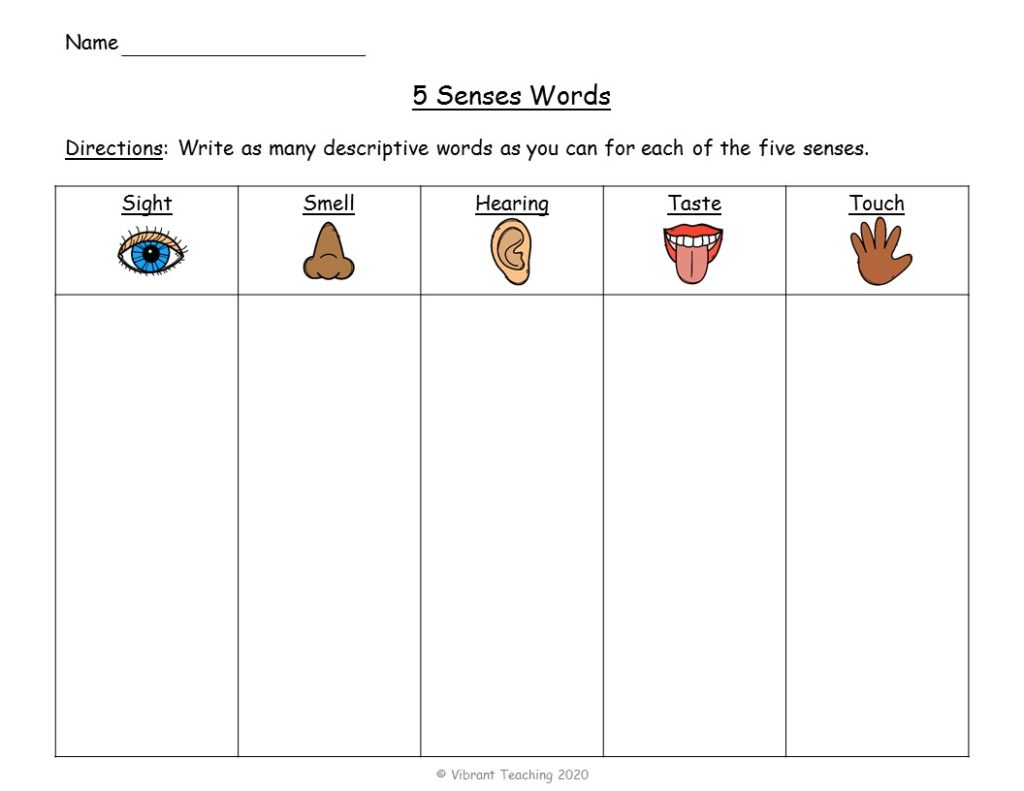
It’s fun to choose one topic and describe it in depth. Look at the list below for some examples of descriptive writing ideas for kids to try.
- Food – pumpkin pie, ice cream, hot chocolate
- Animal – dog, bird, elephant
- Season – winter, spring, summer, fall
- Holiday – Halloween, Thanksgiving, Christmas
- Place – zoo, island, school
- Event – birthday, parade, sporting event
Winter by Mrs. Sutton
Cold harsh wind engulfs me like a tornado.
White fluffy snow falls from the sky.
WHOOSH! The sound of the sled as it races past.
The smell of logs burning in the fireplace.
Sweet hot cocoa hits my tongue.

Autumn is Here by Mrs. Sutton
Bright vibrant red and yellow leaves.
The sound of leaves rustling in the wind.
Cool crisp air surrounds me.
The sweet smell of pumpkin pie as the warmth enters my mouth.
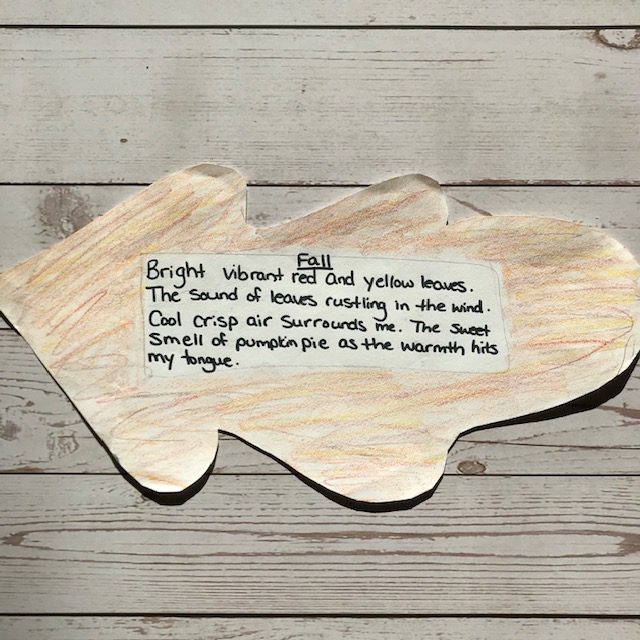
Mentor Texts
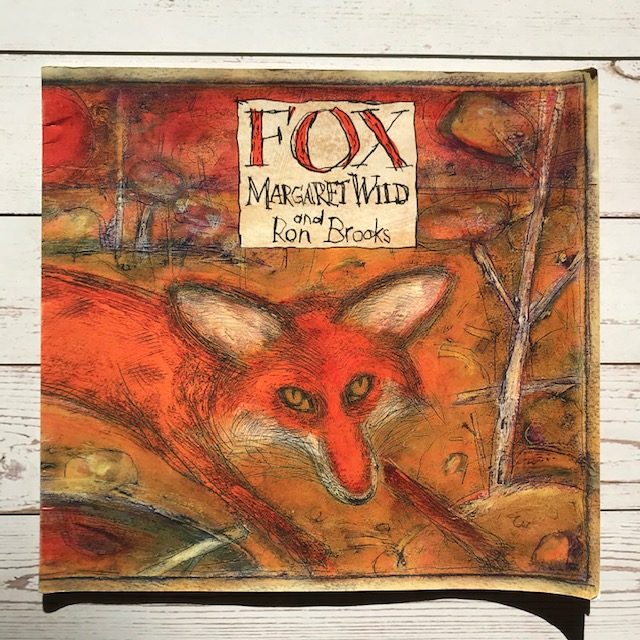
You Might Also Like:
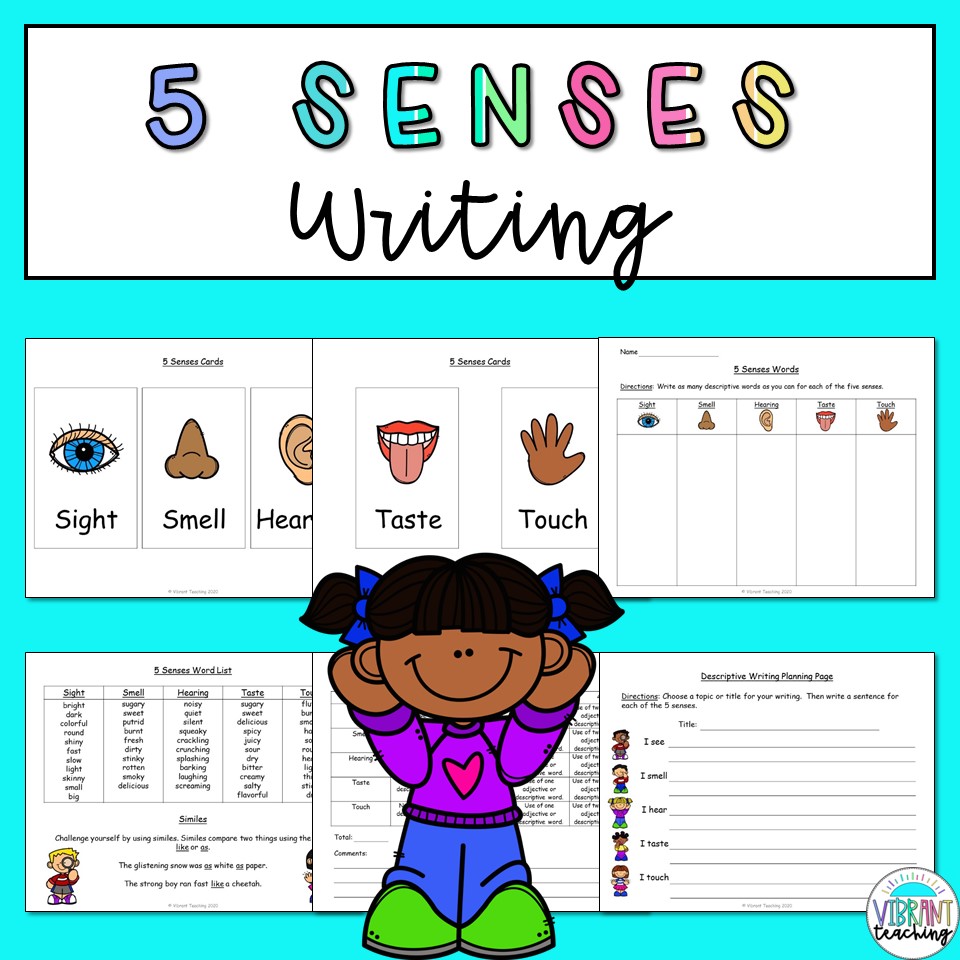
Vibrant Teaching is an Amazon Affiliate and receives a small commission for products purchased through these links. Thanks for your support !
Angela Sutton
Related posts.

Back to School Writing Ideas for Kids

How to Create a Google Classroom

3 Reasons to Use Student Awards
Hi Angela, This article was really helpful for me. Thank you so much for the best resources given.
I’m so glad this information was useful and helpful. I really appreciate your feedback!
Leave a Reply Cancel Reply
I accept the Privacy Policy

I specialize in helping elementary teachers with writing resources, tips, and ideas. My goal is to save teachers time and energy so they can be vibrant inside and outside of the classroom! Read More
SEARCH THE BLOG
Subscribe to our mailing list.
Get the news right in your inbox!
Health and Wellness
- Descriptive Essay
You ever read a really good travel essay? It makes you believe that you are there with the writer, it paints a vivid picture. This is because the essay is so descriptive, that it appeals to our senses. As a result, our brain starts imagining it. Let’s learn more about a descriptive essay.
Suggested Videos
What is a descriptive essay.
Our brain is so powerful that it can easily imagine scenarios and make use of our senses. The job of such an essay is to appeal to our senses in a way that it creates an image in our minds. Hence a descriptive essay plays with at least one of our five senses (touch, smell, taste, hearing, sight).
In other words, the description of the person, place or thing in an essay should be really vivid. This means it after reading the essay, the reader should be left feeling like they actually know the person, have held the object or have visited the place.

In the light of the above-mentioned things, it is comfortable to say that a descriptive essay provides for artistic freedom. For example, assume you’re writing about a house.
Instead of simply stating that the house was beautiful, you should talk about the color of the house, the garden in front of it i.e. all the details about the house. In that way, the readers would be able to imagine the house because of a nicely written essay.
Contents of a Descriptive Essay
As it is with most of the written forms of English literature, the basic structure of a descriptive essay also comprises of an introduction, a body, and the conclusion.
- The introduction of a descriptive essay should be interesting enough to catch a reader’s attention. The introduction should be all about creating a base or a background for the person, place or thing you’re going to describe in your essay.
- Next, the main body of a descriptive essay should appeal to the reader’s senses. This includes unfolding the information by creating images in the reader’s mind. A trick to achieving this is to explain how the subject about which you’re writing in your descriptive essay, appeals to your senses.
- Lastly, the conclusion should summarize the whole essay. Along with again going over the main details about the essay’s subject, you should end the essay in a way that it gives a sense of completion.
How to Write a Descriptive Essay?
Before starting off with a descriptive essay, thinking about the subject in detail will be your best bet. Just take some time off and imagine about the subject. This means to imagine how the subject appeals to your senses- how does it smell, looks like and so on.
Further, if the subject is related to a past experience think about how it felt or your experience with the subject. Next, express all of these on the paper right in front of you. You can also take some time to think about how you want your essay to unfold. Lastly, a revision of the essay provides a great opportunity for improvements and small tweaks. Remember that a descriptive essay is all about teasing the reader’s senses.
A Solved Example For You
Q: A descriptive essay should:
- Narrate a story.
- Appeal to the reader’s senses.
- Present an argument
- None of the above
Ans: The correct option is ‘B’. A descriptive essay should appeal to the reader’s senses in such a way that the reader feels at one with the subject of the essay.
Customize your course in 30 seconds
Which class are you in.

- Non-Classified or Display Advertisements
- Diary Entry
- Story: Characters
5 responses to “Story: Characters”
great article
very clean post.
awesome work
Leave a Reply Cancel reply
Your email address will not be published. Required fields are marked *
Download the App


Descriptive Essay
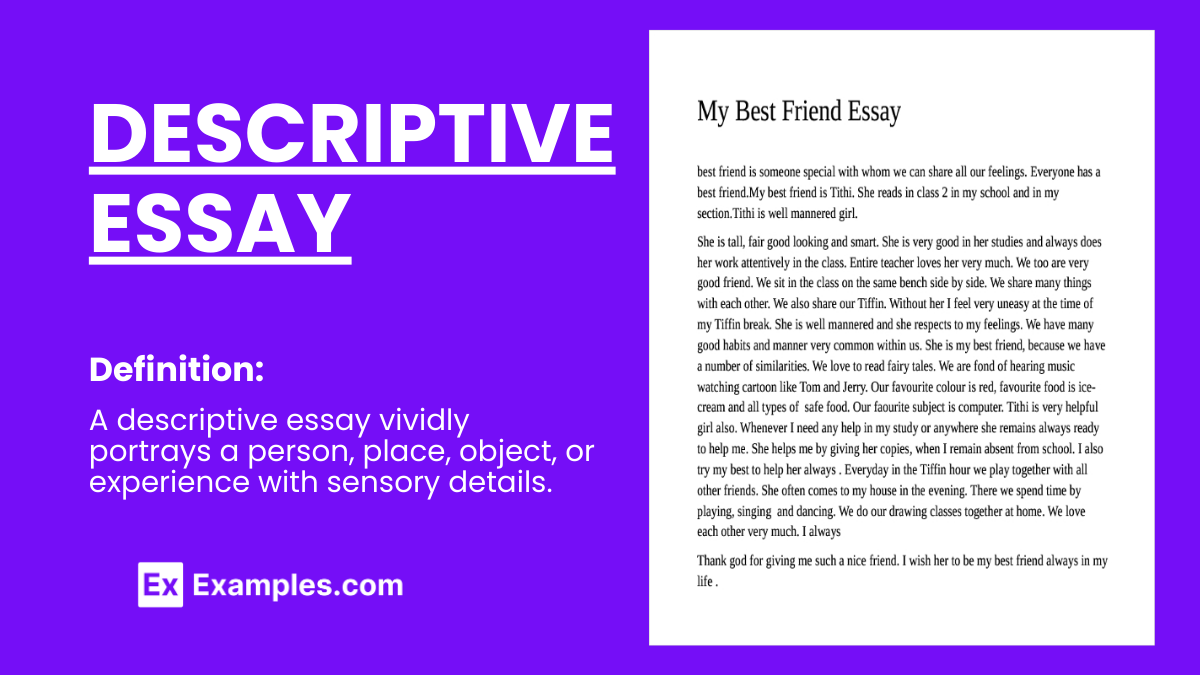
Essays are written due to various reasons and purposes. Some of the authors want to inform, some want to expose while some want to persuade. However, in descriptive essay writing , the essayist composes for the sake of displaying a picture out of his/her describing words. It may sound easy and simple but don’t be deceived, there are still more to learn. Read through this article to get hold of significant and beneficial new knowledge.
What is Descriptive Essay? A descriptive essay is a type of writing that aims to vividly describe a person, place, object, or event. In this type of essay, the writer uses sensory details such as sight, sound, smell, taste, and touch to create a clear and vivid image in the reader’s mind. The goal of a descriptive essay is to evoke a strong emotional response or create a vivid impression of the subject being described.
Descriptive Essay Format
Introduction.
Hook: Start with a sentence that captures the reader’s attention. This could be a striking fact, a question, or a vivid description. Context: Provide some background information to set the scene. Describe the setting, the situation, or the object of the essay. Thesis Statement: End the introduction with a clear thesis statement that outlines the main aspects or the overall impression of your subject.
Body Paragraphs
Each body paragraph should focus on a specific aspect or a detail that contributes to the overall picture you are trying to paint. Use the “show, don’t tell” technique by employing vivid imagery and sensory details.
Paragraph 1: Sight
Topic Sentence: Introduce the aspect of sight. Details: Describe what you see in vivid detail. Use adjectives and adverbs to bring the scene to life. Closing Sentence: Wrap up the paragraph by summarizing the importance of the visual details.
Paragraph 2: Sound
Topic Sentence: Focus on the sounds related to your topic. Details: Describe what can be heard, whether it’s the background noise, a specific sound related to the subject, or the absence of sound. Closing Sentence: Conclude by explaining how the sounds contribute to the overall impression.
Paragraph 3: Smell
Topic Sentence: Highlight the aspect of smell. Details: Describe the aromas and scents. Whether it’s pleasant or pungent, detail how it impacts the scene or the subject. Closing Sentence: Summarize how the smell adds to the depth of your description.
Paragraph 4: Touch
Topic Sentence: Discuss the sense of touch. Details: Describe the textures and temperatures. Explain how something feels to the touch and why it’s important to your description. Closing Sentence: Link the tactile details to the overall experience.
Paragraph 5: Taste (if applicable)
Topic Sentence: Introduce the sense of taste, if relevant. Details: Describe the flavors and the experience of tasting something related to your subject. Closing Sentence: Reflect on how taste enhances the description.
Summary: Briefly restate your thesis and summarize the main points of your essay. Significance: Explain the significance of the subject and the impact it has made on you or the impression it leaves. Closing Thought: End with a final thought or reflection, leaving the reader with something to ponder.
Example of Descriptive Essay
“The Sunset at the Beach” As I walked down the sandy path towards the ocean, the first thing that struck me was the vast expanse of the sea, stretching endlessly towards the horizon. The sun was beginning to set, painting the sky in shades of orange, pink, and purple. The beauty of the sunset at the beach was a breathtaking spectacle that I had come to witness. Introduction The beach has always been a place of serenity for me, especially during the sunset. The way the sun dipped below the horizon, leaving behind a tapestry of colors, always seemed magical. On this particular evening, the scene was set for a perfect display of nature’s artistry. Body Paragraphs The Vision of the Sunset As I stepped onto the soft, warm sand, my eyes were immediately drawn to the horizon. The sun, a fiery orb, was slowly descending, casting its golden glow across the sky. The clouds, mere wisps earlier in the day, now looked like cotton candy, stained with hues of pink and lavender. The reflection of the sunset on the water added a layer of brilliance to the scene, with the light dancing on the waves as they gently lapped against the shore. The Symphony of the Waves The sound of the waves provided a soothing background melody to the visual spectacle. Each wave crashed against the shore with a rhythm that was both calming and invigorating. In the distance, seagulls called to one another, their cries adding to the orchestral performance of nature. The rustling of the palm leaves in the gentle breeze played a soft, whispering harmony, creating a symphony that only the beach at sunset could offer. The Aromatic Breeze With every breath, the salty tang of the sea air filled my lungs, a distinctive aroma that immediately relaxed my body and mind. There was a freshness to it, a reminder of the vast, untamed ocean before me. Mixed with the faint scent of sunscreen and the earthiness of wet sand, the beach’s aroma was invigorating, grounding me in the moment. The Touch of Nature As I walked along the water’s edge, the cool water washed over my feet, providing relief from the day’s residual heat. The sand, now cooler than the afternoon sun, felt soft and comforting beneath my toes. Occasionally, a stronger wave would rush further up the beach, encouraging me to dig my feet into the sand, feeling the grains shift against my skin. Conclusion The sunset at the beach was not just a visual masterpiece; it was an experience that engaged all the senses. As the sun finally disappeared, leaving behind a sky painted in dark blues and purples, I felt a sense of peace and contentment. The beach at sunset had offered me a moment of beauty, tranquility, and a deep connection with nature. It was an unforgettable scene, etched in my memory, reminding me of the simple, yet profound joys of life.
Descriptive essays generally focus more on visualizing a specific topic of interest. Considering that aspect, showing you what it looks like may be helpful as well. Thus, we cautiously gathered the best samples and templates of descriptive essays for you to rely on, here are they:
Bright Topic Ideas for Your Descriptive Essay
The list of the possible topic ideas for your descriptive essay is limitless. There are a lot of choices to choose from and sometimes, it is really difficult to pick one. If you are being indecisive regarding your topic idea, here are some smart concepts to help you select one.
Descriptive Essay Ideas About People
- Description of your favorite music genre
- Treating a popular villain as a good protagonist
- The right words that would compliment your singing idol
- Why your squad is the best?
- What qualities should your future spouse possess?
- Why your aunt is the best?
Descriptive Essay Ideas About Places
- Why Manila Bay has the best sunset?
- The perfect adjective to describe your hometown
- Details on your recent vacation destination
- Why your favorite coffee shop is worth the visit?
- What makes Paris unique?
- The best description for your workplace
Descriptive Essay Ideas About Things
- Why your wedding ring is the most luxurious?
- The description of your favorite blanket
- What makes your research paper great?
- Description of your proposed food product
- Perfume: more than just the bottle
- Why your bag is great
Descriptive Essay Examples & Templates
Descriptive narrative essay example.
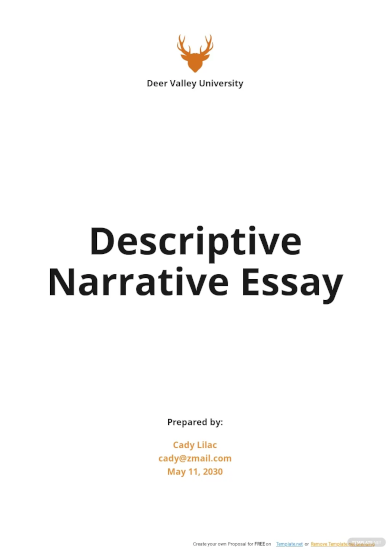
Descriptive Essay Outline Example
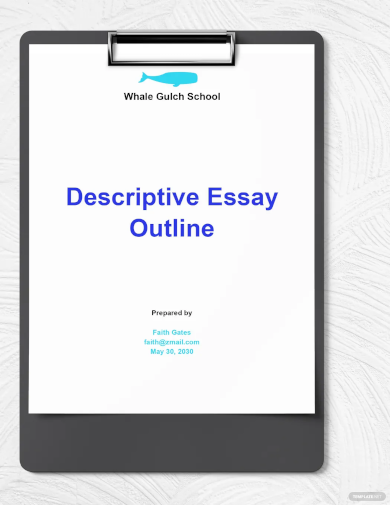
Short Essay Plan Example
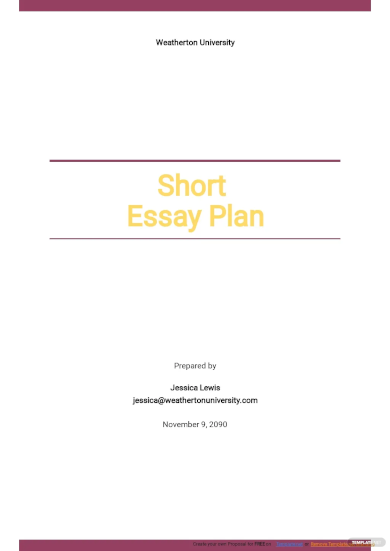
Biographical Narrative Essay Example
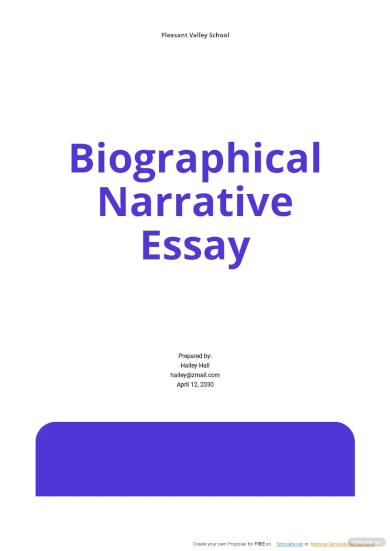

College Narrative Essay Example
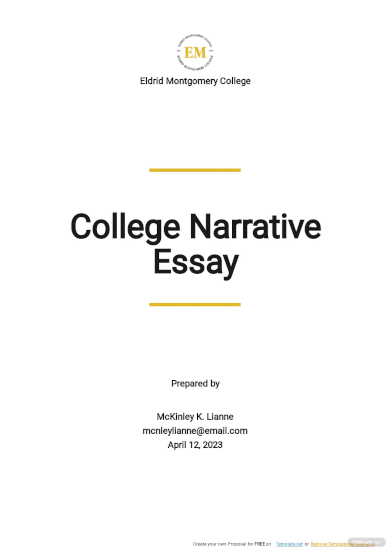
Personal Narrative Essay Example
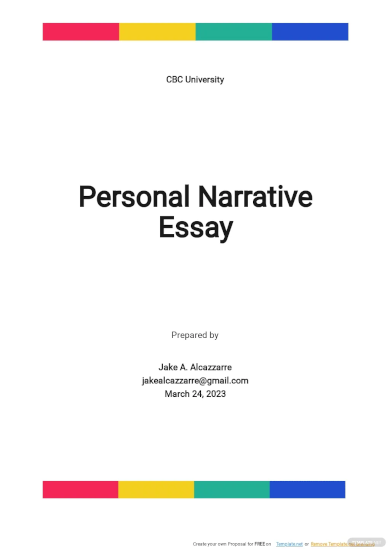
Short Narrative Essay Example
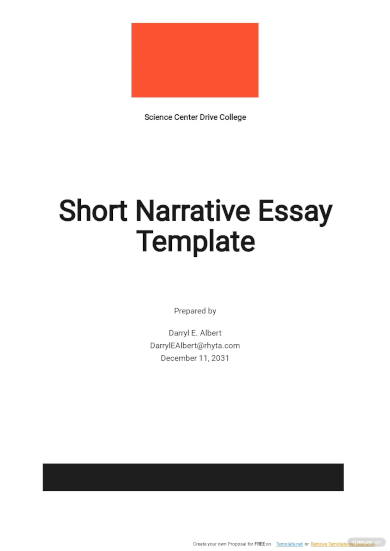
High School Descriptive Essay Example

Free Simple Descriptive Essay Plan
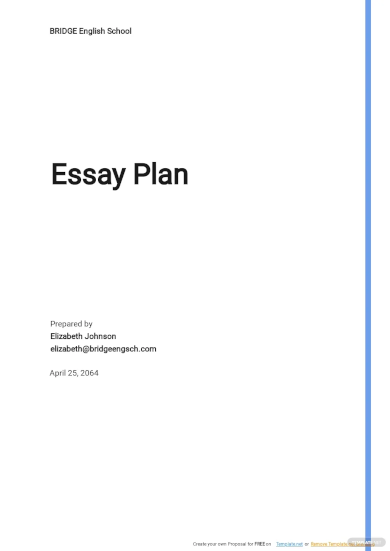
Basic Descriptive Essay Writing Example
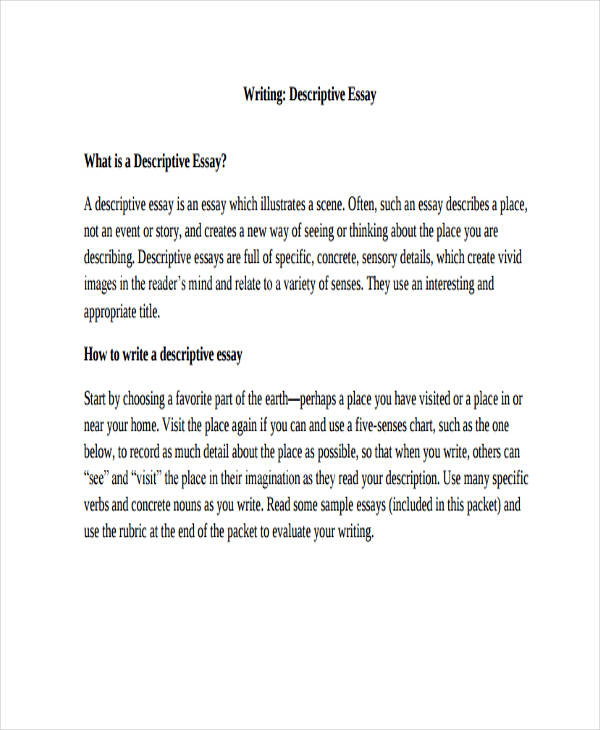
latterdaylearning.org
Short Descriptive Essay Example
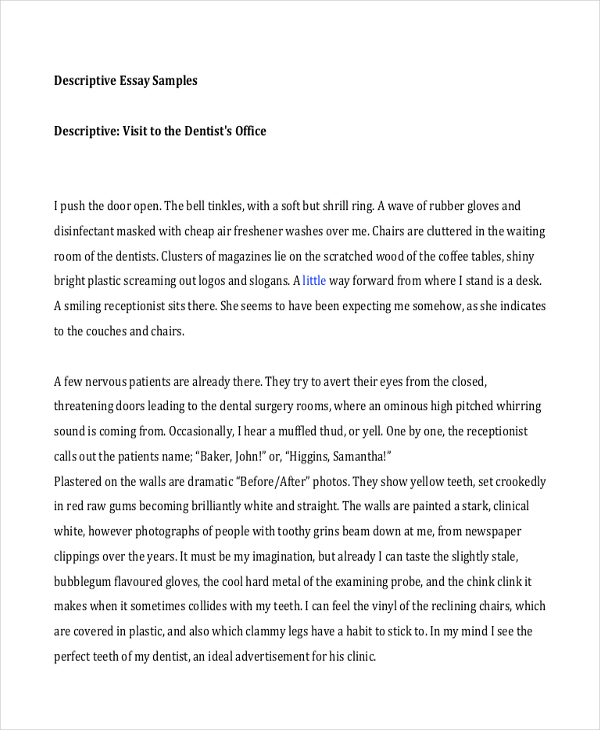
trudyamiller.wikispaces.com
Descriptive Essay Structuring Example
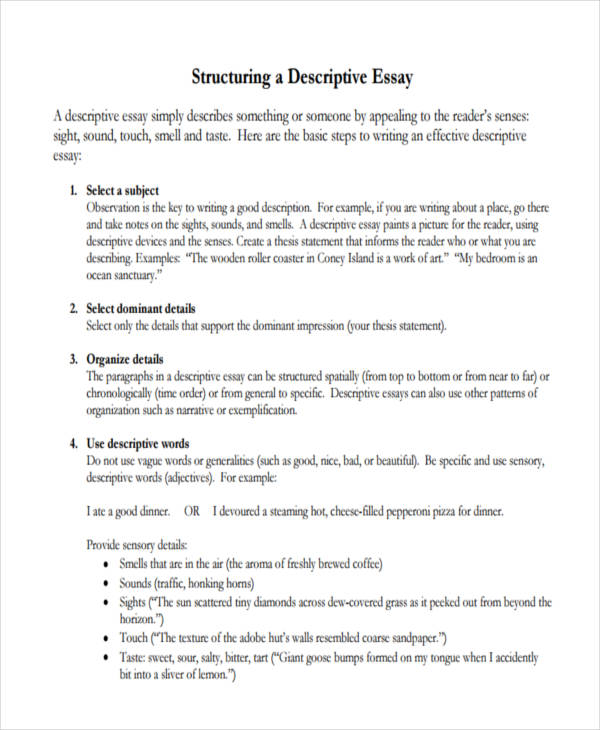
colegiobennett.org
Simple Descriptive Essay Example

essssay.com
Narrative Descriptive Essay Example

preservearticles.com
Descriptive Essay Prewriting Example
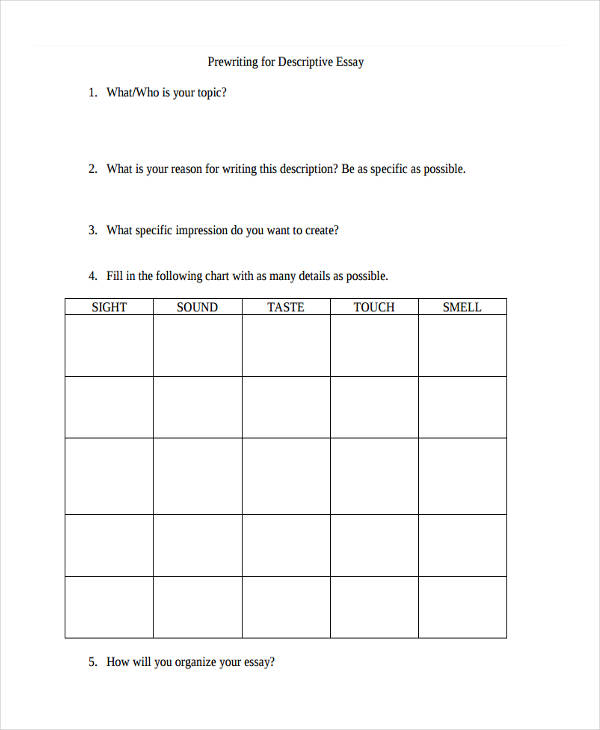
fileserver.net-texts.com
Personal Descriptive Essay Example
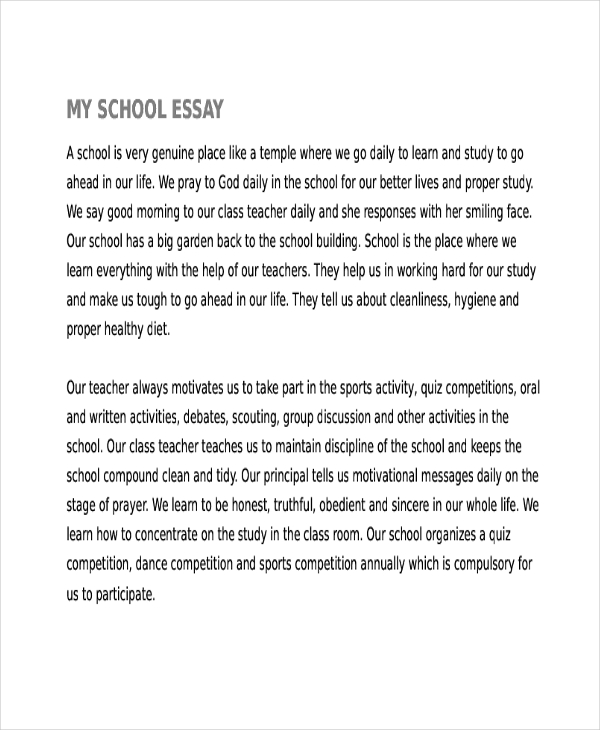
indiacelebrating.com
Descriptive Essay Characteristics Example
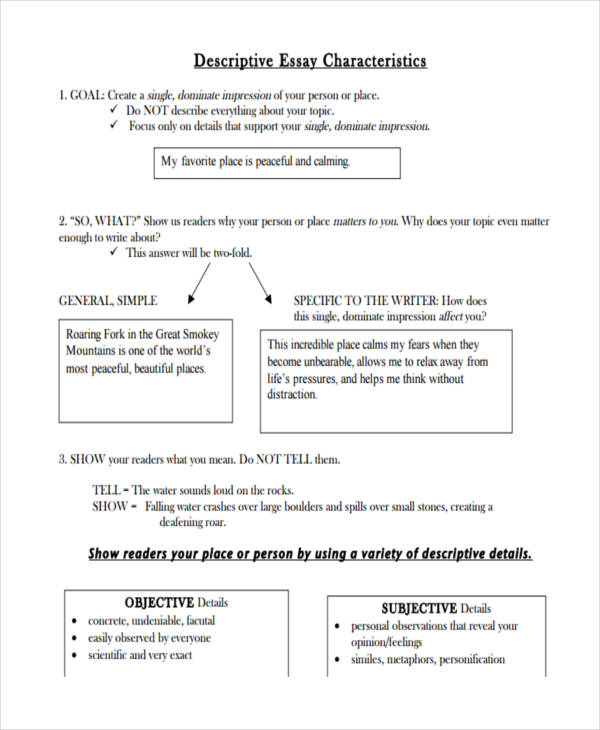
Descriptive Essay Description Guide Example
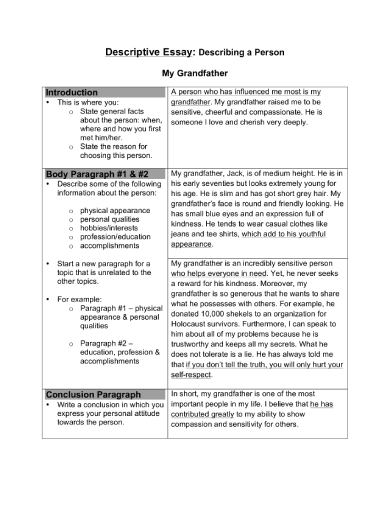
ortbinyaminaenglish.yolasite.com
Descriptive Essays about Places Example
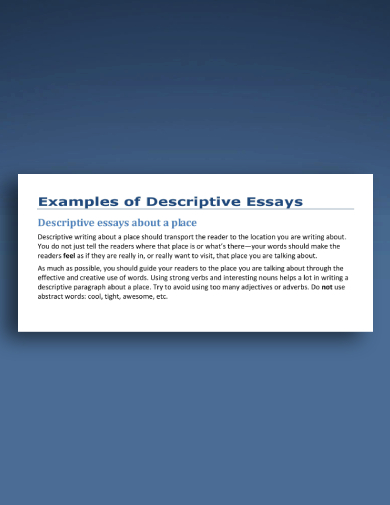
Excellent Descriptive Essay Example
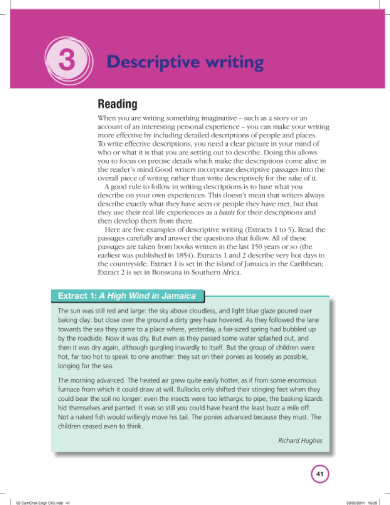
hoddereducation.co.uk
Descriptive Essay Writing Exercise Example
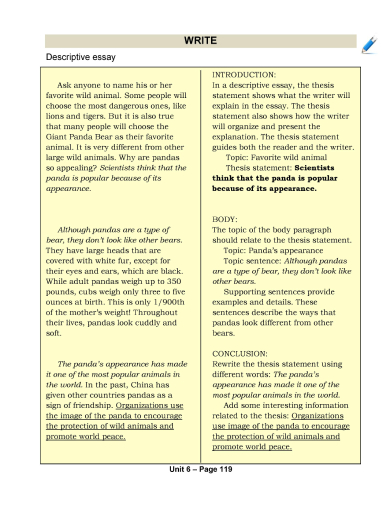
Educational Descriptive Essay Example
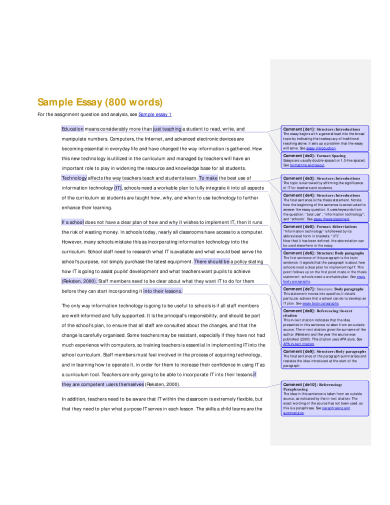
owll.massey.ac.nz
Spring Break Descriptive Essay Example
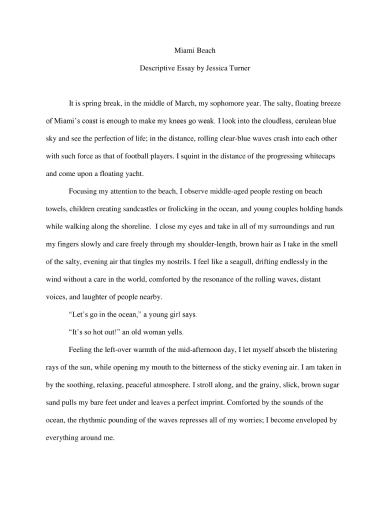
cheylin.com
Descriptive Essay Sentence Writing Example
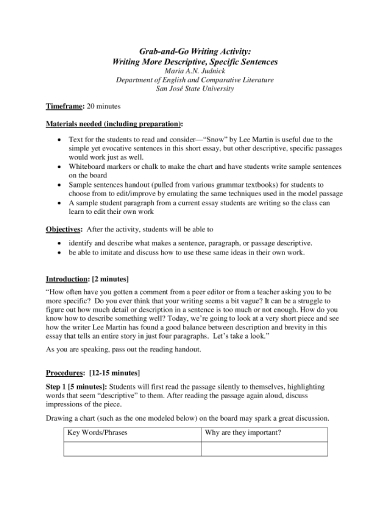
Descriptive Essay Paragraph Guidelines Example
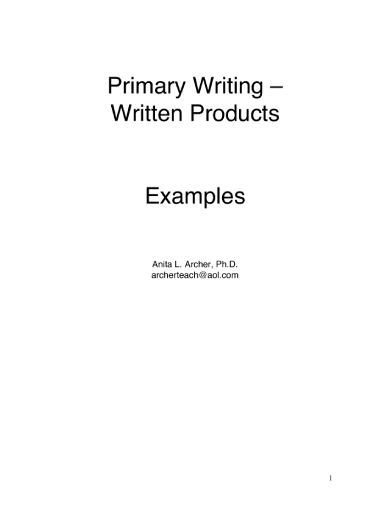
Stylish Descriptive Essay Rubric Example
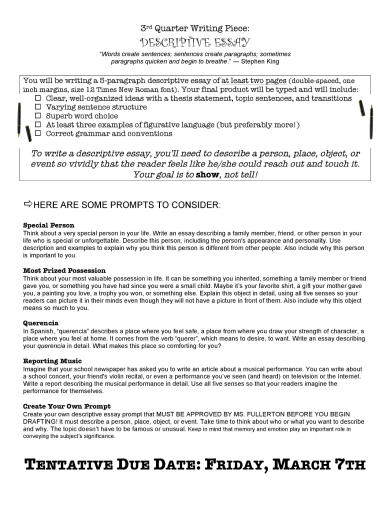
Descriptive Essay Writing Techniques Example
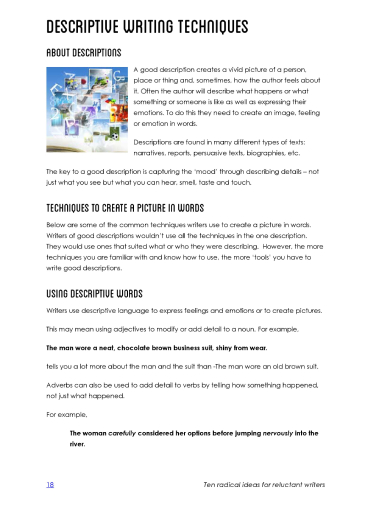
multifangled.com.au
Free Descriptive Essay Example
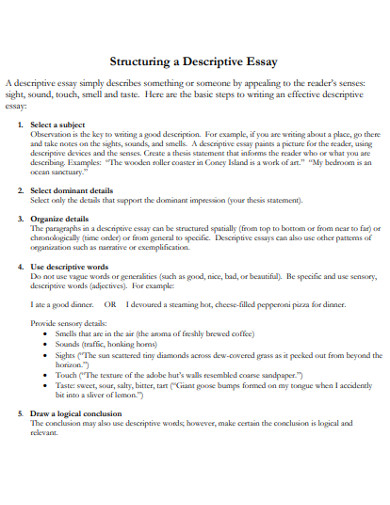
asc.weebly.com
Basic Descriptive Essay Example
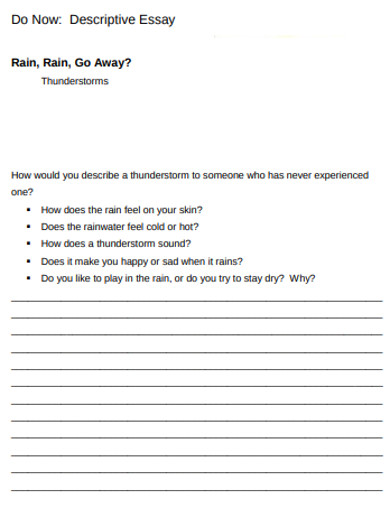
hortonskids.org
Sample Descriptive Essay Example
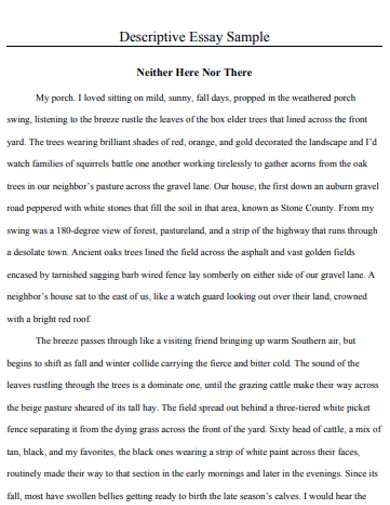
essaytigers.com
Descriptive Essay in PDF Example
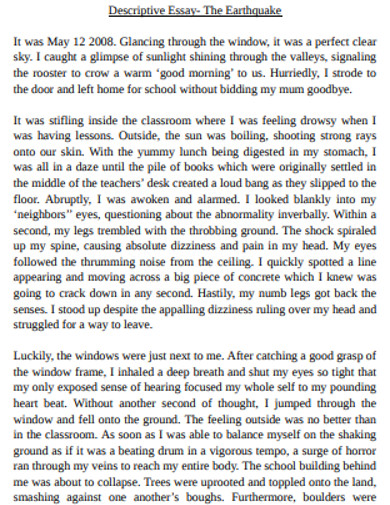
Printable Descriptive Essay Example
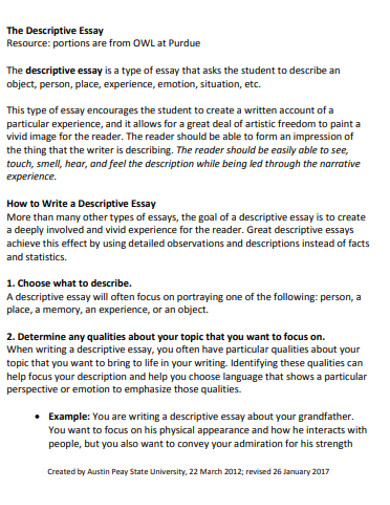
Direction Descriptive Essay Example
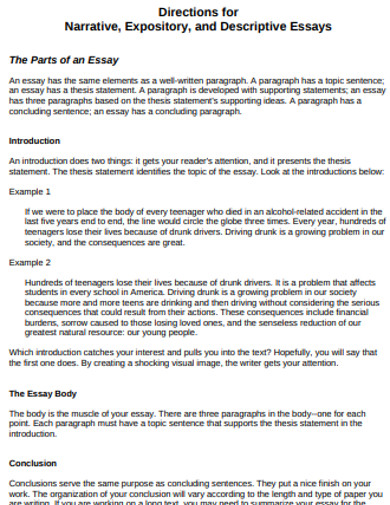
wba.aplusanywhere.com
Descriptive Essay Scoring Guide
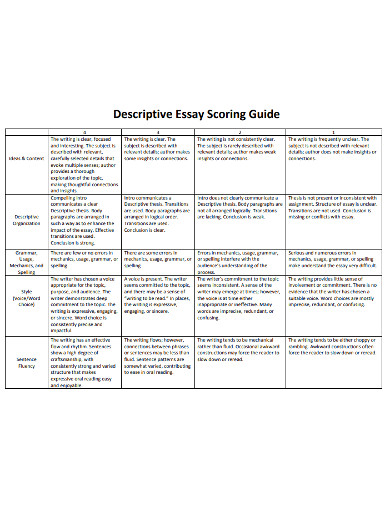
washoeschools.net
Professional Descriptive Essay
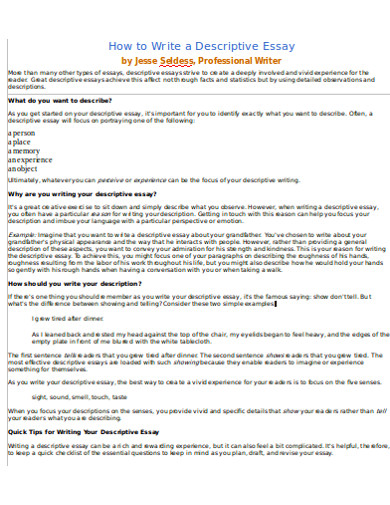
Descriptive Essay Format Example
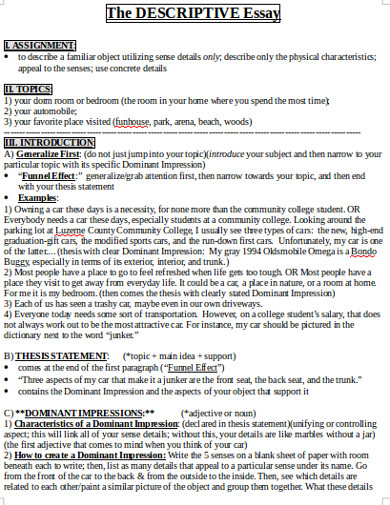
staff.kings.edu
Assignment Descriptive Essay Example
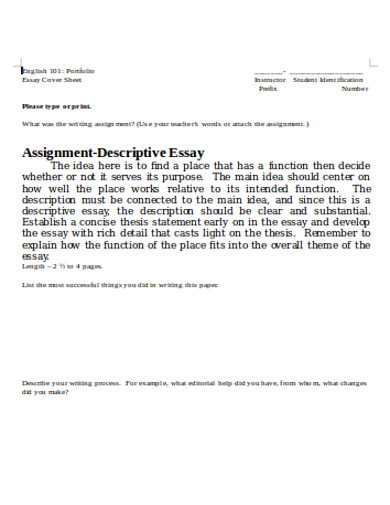
fd.valenciacollege.edu
What are the 4 types of essays?
An essay is an extended piece or composition that shows and supports a thesis or proposition. Essays help the expression of an author’s ideas in various ways. Before composing your own essay, it is important to identify its purpose first, and in doing that, distinguishing its type would be a great beginning. Correspondingly, here are the four different types of essays:
Narrative Essays: to tell
Taking it into its most basic sense, narrative essays are used if the author wants to tell a story about a real-life adventure. This type of essay is expressed in a particular point-of-view. Commonly, it is the author’s viewpoint that is being followed. Moreover, in writing your own short narrative essay , apply realistic emotions and appropriate sensory details to provide your readers with the full taste of your story. By doing this, you are not simply telling them but also engaging them in the story’s sequence and elements. It is also advisable to state verbs as vivid and as precise as possible. The thesis statement of a narrative essay is commonly found in the opening sentence or the last sentence of the introductory paragraph.
Descriptive Essays: to describe
You may confuse yourself between narrative and descriptive essays ; however, differentiating both is really easy. Rather than telling a story, a descriptive essay illustrates a specific topic such as a person, place, experience, emotion, event, etc. by means of words. You don’t simply state your experience in this type of essay; on top of that, you let your reader experience the same thing through your descriptions. In writing your own short descriptive essay , it is important to remember that you are not writing to tell but to show. Using sensory and vivid words is also recommended.
Expository Essays: to uncover and clarify
From its name itself, an expository essay is used to expose something on matters that are known to others. This type of essay is a genre of composition that aims to explain, illustrate, clarify or explicate a certain subject for the readers. Thus, an expository essay could include investigation and evaluation of ideas. This could be derived through comparison and contrast, definition, giving examples, assessment of cause and effect, etc. Moreover, in composing an expository essay, the author set his/her emotions aside for this type of essay is based on mere facts. The first point-of-view is not applied in this essay as well.
Persuasive Essays: to convince
If the expository essays talk about the facts then persuasive essays talk about arguments. The main purpose of a persuasive essay is to win over the trust of the reader to accept your viewpoint, opinion or proposition as the author. In writing a persuasive essay, your opinions should be supported by relevant facts and logical and sound reasoning. Though the essayist should lay all necessary details from both sides of the argument, he/she must comprehensibly explain why one side is correct or more favorable than the other.
Despite essays being categorized into four types, it is also important to know that an essay is not limited to one type only. In some cases, a narrative essay could also be mixed with a short descriptive essay or a short persuasive essay combined with an expository type. Nevertheless, identifying the purpose of your essay is vital before writing. However, if doing it challenges you, knowing these types is a great substitute.
What Is the Purpose of a Descriptive Essay?
Some people like to watch movies rather than to read books. This is because an actual image is easier to absorb than that on writing. This is why it’s important for a writer to pay close attention to detail. A descriptive essay conclusion should provide the reader with a mental picture of a given matter.
This is especially essential when writing pieces meant for a younger audience, as they have a more imaginative mind than the average adult. A writer must be creative when using imaginative language in order for the reader to properly comprehend what is being portrayed. To do so, the writer should also be knowledgeable about the topic. After all, you don’t want to give your readers the wrong interpretation .
How to Write a Descriptive Essay
A good descriptive essay comes from a knowledgeable and imaginative mind. Thus, in descriptive writing , it’s important for one to be specific on details. After seeing a few samples that we have shown earlier, here is a step-by-step guideline to help you in composing a descriptive essay worth reading.
1. Choose a topic.
If there is no given topic, it would be great to select one that you are knowledgeable and familiar with. Considering that your whole descriptive essay would revolve on this specific subject, choosing a topic that you recognize would keep everything simpler for you. By doing such, you can freely decide what words are the most appropriate to use; as a result, it will be easier for you to describe your topic. Furthermore, your reader could be meticulous and educated on your subject, so being knowledgeable about your own topic is wise prevention against bad impression.
2. Construct your thesis statement.
Alright, now that you have your own topic already, it is important to know what specific message you want your reader should focus on reading your whole essay. Thus, it is important to always provide a thesis statement , the umbrella sentence of all your ideas. Write this in one concise sentence in your introduction and conclusion. Often, a thesis statement is mentioned in the last sentence of your introductory paragraph.
3. Gather the necessary information and ideas.
Though you are already proficient in your topic, it is still recommendable to research about your specific subject. With this, you are not just gaining new information but also checking the correctness of your knowledge. It would also be great to expand your vocabulary, especially in adjectives and adverbs, since writing one of these involve loads of describing. Moreover, also focus on the sensory words that correspond to sight, smell, taste, sound, and touch of the given subject.
4. Create an outline.
Obtaining all of the significant details, crafting an essay outline for your work will allow you to arrange your contents in a rational and chronological order. Also, being educated with different formats in writing an essay would really make a great difference in your composition.
5. Proofread.
After writing your own descriptive essay, it might feel perfect already, but most of the time, it is not. Hence, read your entire work and review if there are any errors pertaining to your grammar and spelling. Furthermore, asking for help from a well-versed friend of yours to conduct a peer-review to your work would be extremely useful.
6. Finalize your composition.
The next thing to do after the editing is to finalize your descriptive essay to its finest version. Make sure that your essay follows a specific format, consisting of the proper parts of the essay .
Smart Tips for Writing a Descriptive Essay
The fundamentals of the descriptive writing procedures are now given to you; nevertheless, it would always be great to aim for something better. Now, here are some intelligent tips that would make your essay certainly more compelling.
Establish a connection with your writing.
The key to writing a good effective essay is to have the passion to write it; thus, in choosing your topic it would be great to have a familiar one or a subject that truly makes you curious. Let your interest be the seed of your fruitful composition.
Spend time to think.
In writing your own descriptive essay, let your brain do its job. Do not rush, give yourself an adequate amount of time to ponder on the necessary details that you should include and what approach you should apply. Provide yourself a clear plan of your descriptive essay writing. Moreover, look at your topic from different angles. This will allow you to take a closer look at every detail of your subject.
Apply the word vomit technique.
The word vomit technique or also called as “ free writing ” is the spontaneous use of words without considering any rules. This is a good technique in making a draft of your starting an essay . It allows your ideas to keep flowing without exerting much effort. Once this is done, you can pick out points that would go well with your essay.
Take a break before finalizing it.
Because right after writing your composition, your thought highly recognizes your word construction; thus, it does not really notice the errors and automatically treats them as correct pieces of your work. Allowing your mind to clear out for a while will make it easier for you to critic your own work. Furthermore, utilizing grammar-checking software is also a splendid move.

Descriptive Essay Generator
Text prompt
- Instructive
- Professional
Write a descriptive essay about a place you love to visit and what makes it special.
Describe in a descriptive essay your dream job and what it would be like to work there.
How to Write a Descriptive Essay

Working on a descriptive essay is like handing your reader a pair of magical glasses – it allows them to see, feel, and experience what you're describing. It's not just about listing facts – it's about immersing your reader in a sensory adventure. Fun fact: Studies show that our brains respond to vivid imagery as if we're actually experiencing the described scene. So, by painting a detailed picture with your words, you're not just telling a story – you're triggering a sensory response in your reader's brain, making the whole experience more memorable and engaging. It's like turning your essay into a mini-vacation for your reader's mind. In this article, students who haven’t delegated their tasks to essay writers yet will find a detailed explanation of descriptive writing with the definition, tips, and examples. Stay tuned!
What Is a Descriptive Essay
A descriptive essay is a form of writing that employs vivid language and sensory details to create a vivid picture or experience for the reader. Unlike other types of essays that may focus on analyzing, persuading, or narrating, the primary goal of this type of an essay is to paint a compelling and detailed picture in the reader's mind. It often involves the writer using descriptive words, metaphors, and other literary devices to convey a sensory experience, allowing the reader to visualize, feel, hear, smell, and taste what is being described. The purpose is to evoke a strong emotional response and engage the reader's imagination, making them feel like they are part of the depicted scene or moment.
In a descriptive essay, the writer carefully selects and organizes details to convey a specific impression or mood. The subject matter can range from a personal experience to observing a place, event, or object. The effectiveness lies in the writer's ability to create a vivid and immersive experience, enabling the reader to connect with the described subject on a deeper level. Ultimately, a well-executed descriptive essay leaves a lasting impression by bringing words to life and making the reader experience the depicted elements in a tangible and memorable way. You can also consult a reflection paper example for additional writing hints.
Need Some Help?
You will get your written masterpiece delivered to you on time, with a smile on your face!
Description vs. Descriptive Essay
Description and descriptive essays are related concepts, but they differ in scope and form. Description is a broader term that refers to the act of detailing the characteristics or features of something, someone, or a specific situation. It can be a component of various types of writing, not limited to essays. Description can be found in narratives, expository writing, and even technical or scientific writing, where clarity and precision in detailing are crucial. In essence, description is a tool used in writing to enhance understanding and create a vivid mental image.
On the other hand, a descriptive essay is a specific genre of writing that focuses entirely on painting a comprehensive and detailed picture using descriptive language. It is a more concentrated form of expression, where the writer's primary objective is to engage the reader's senses and emotions. Our custom writers suggest that a descriptive essay typically centers around a particular theme, experience, or subject, and it employs vivid imagery, figurative language, and sensory details to create a captivating narrative. Unlike a simple description, a descriptive essay has a more structured and narrative-oriented format, often with an introduction, body paragraphs, and a conclusion.
.webp)
What to Describe in Your Essay
In a descriptive essay, you have the opportunity to portray a particular subject vividly, and the key is to engage the reader's senses and imagination. Here are some ideas on what you can describe:
- Scenic Locations. Transport your reader to a specific place – a serene beach, a bustling city street, a lush forest, or an ancient castle. Describe the sights, sounds, smells, and feelings associated with that location.
- Memorable Experiences. Share a personal experience that left a lasting impression on you. It could be a significant event, a life-changing moment, or even a routine activity that holds special meaning.
- People. Describe a person who has had a profound impact on your life or someone you find intriguing. Focus not only on their physical appearance but also on their personality, quirks, and the emotions they evoke.
- Objects. Choose a specific object, whether it's a cherished possession, a historical artifact, or something mundane yet interesting. Explore its significance and how it makes you feel.
- Seasons and Weather. Capture the essence of a particular season or weather condition. Whether it's the warmth of a summer day, the crispness of autumn, or the sound of raindrops on a window – make the reader feel the atmosphere.
- Animals or Pets. Bring to life a beloved pet or an encounter with a fascinating animal. Describe their appearance, behavior, and the emotions they evoke in you.
- Cultural Events. Attend a cultural event, festival, or celebration, and describe the vibrant colors, sounds, and traditions. Explore how these events make you feel and their cultural significance.
- Art and Creativity. Choose a piece of art, a sculpture, or a creative work that captivates you. Dive into the details, uncovering the emotions it evokes and its impact on your perception.
Today, you can request help with dissertation or any other written assignment, such as an essay, from competent writers with years of academic experience.

Two Approaches to Writing a Descriptive Essay
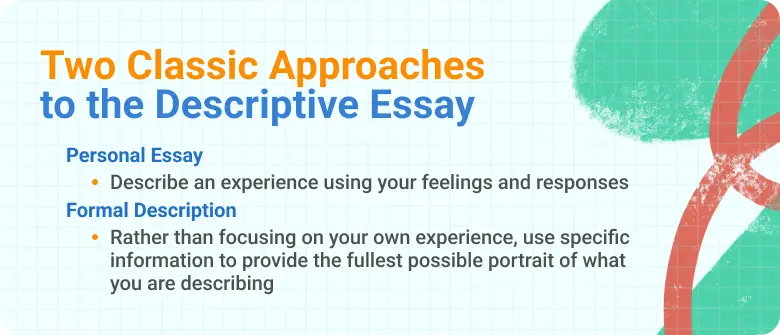
There are generally two primary approaches to writing a descriptive essay, each emphasizing a different aspect of the subject. These approaches help shape the overall tone and purpose of the essay:
Objective Approach. In the objective approach, the writer strives to provide a detailed and accurate portrayal of the subject without injecting personal emotions or opinions. This method is often employed in academic and technical writing. The focus is on presenting an unbiased, factual description that allows readers to form their own opinions. For example, if describing a historical monument, the writer would focus on architectural details, historical context, and other observable features without interjecting personal feelings.
Subjective Approach. Conversely, the subjective approach encourages the writer to infuse personal experiences, emotions, and opinions into the description. This approach is often used in creative writing, personal narratives, or essays that aim to evoke specific emotions in the reader. When using a subjective approach, the writer might vividly describe how the subject makes them feel, drawing on personal memories and sensory experiences. For instance, if describing a favorite childhood place, the writer might delve into nostalgic emotions and memories associated with that location.
The choice between these approaches depends on the writer's goals and the intended impact on the reader. Some essays may even blend elements of both approaches, providing factual details while also conveying the writer's emotional connection to the subject. The key is to be intentional in choosing the approach that best serves the purpose of the descriptive essay. Or, you can buy cheap essay to avoid the trouble now and save valuable free time.
Descriptive Essay Topics
Choosing topics for descriptive essay can greatly benefit students by helping them improve their writing skills and unleash their creativity. These assignments allow students to dive deep into a subject and practice using colorful language, vivid descriptions, and creative imagery. By focusing on details, students learn to observe the world around them more closely and appreciate the nuances of their surroundings.
Exploring various topics also allows students to expand their knowledge and understanding of different cultures, experiences, and environments, fostering empathy and a broader perspective. In essence, descriptive essay topics provide students with a valuable opportunity to develop their writing abilities while gaining a deeper appreciation for the power of language and observation.

- A day at the beach.
- My favorite childhood memory.
- The cozy corner of my room.
- A rainy day in the park.
- The bustling farmer's market.
- An unforgettable family gathering.
- The charming old bookstore.
- My pet's quirky habits.
- The perfect pizza slice.
- Sunrise over the city.
- A peaceful forest glade.
- The hectic school cafeteria.
- A quiet Sunday morning.
- Exploring a hidden trail.
- The enchanting winter wonderland.
- The lively street fair.
- Inside Grandma's kitchen.
- A colorful autumn day.
- My favorite room in the house.
- The first day of school.
- A historic landmark in my town.
- Sunset on the lakeshore.
- The adorable neighborhood coffee shop.
- A vibrant street art mural.
- My most comfortable outfit.
- The quaint village square.
- A walk through the botanical garden.
- The excitement of a carnival.
- A quirky antique shop.
- Sunday afternoon picnic.
If you need more ideas, consult our guide on narrative essay topics .
Descriptive Essay Outline
An outline for a descriptive essay serves as a roadmap for organizing and structuring the content of your essay to ensure a coherent and engaging narrative. Here's a simple breakdown of the typical components of a descriptive essay outline:
Descriptive Essay Introduction
- Hook. Begin with a captivating opening sentence to grab the reader's attention.
- Thesis Statement. Clearly state the main idea or purpose of your essay.
Body Paragraphs (usually three to four)
- Topic Sentence. Start each paragraph with a clear topic sentence that introduces the main point.
- Details and Descriptions. Elaborate on the topic sentence by providing vivid and specific details, using sensory language to engage the reader's senses.
- Transitions. Use smooth transitions between paragraphs to maintain the flow of the essay.
- Restate Thesis. Recap the main idea of the essay without introducing new information.
- Summarize Key Points. Briefly revisit the main details discussed in the body paragraphs.
- Closing Statement. End with a concluding thought that leaves a lasting impression or provokes further reflection.
Review and Revise
- Check for Consistency. Ensure that your descriptions are consistent and align with the overall theme.
- Grammar and Style. Review your essay for grammatical errors and refine your writing style.
- Peer Review. If possible, seek feedback from others to gain different perspectives on your essay.
Remember, this is a flexible descriptive essay writing framework, and the number of body paragraphs can vary based on the specific requirements of your assignment. The key to how to write a descriptive essay is to maintain a logical and organized structure that guides the reader through a rich and immersive experience of the subject you're describing.
Stages of Writing a Descriptive Essay
Writing a descriptive essay involves several stages, each crucial to the development of a vivid and engaging narrative. Here's an overview of the key stages:
.webp)
- Choose a Topic. Select a subject that is meaningful, interesting, and conducive to detailed description.
- Brainstorming. Generate ideas related to the chosen topic, jotting down sensory details, emotions, and specific experiences associated with it.
- Thesis Statement. Develop a clear thesis statement that conveys the main purpose or impression you want to leave with your readers.
- Introduction. Craft an engaging introduction that hooks the reader and includes the thesis statement.
- Body Paragraphs. Develop each paragraph around a specific aspect of your topic, providing detailed descriptions and utilizing sensory language.
- Organization. Arrange your paragraphs logically, using a chronological, spatial, or thematic structure to guide the reader through the experience.
- Transition Sentences. Use transitional sentences to ensure a smooth flow between paragraphs and ideas.
- Content Review. Evaluate the effectiveness of your descriptions, ensuring they contribute to the overall theme and purpose of the essay.
- Clarity and Coherence. Check for clarity and coherence in your writing, ensuring that readers can follow your narrative easily.
- Sensory Language. Enhance the use of sensory language, making sure that your descriptions evoke vivid images and engage the reader's senses.
- Thesis Refinement. Fine-tune your thesis statement to reflect any adjustments made during the drafting process.
Editing and Proofreading
- Grammar and Punctuation. Review your essay for grammatical errors, punctuation issues, and proper sentence structure.
- Consistency. Check for consistency in tense, point of view, and overall writing style.
- Word Choice. Ensure that your vocabulary is precise and contributes to the richness of your descriptions.
- Final Check. Conduct a final proofread to catch any remaining errors, typos, or formatting issues.
- Peer Review. If possible, seek feedback from peers or instructors to gain additional perspectives on your essay.
- Structure. Ensure your essay has a clear structure with an introduction, body paragraphs, and a conclusion.
- Font and Font Size. Adhere to any specific formatting guidelines provided by your instructor, including font type and size.
- Margins and Spacing. Check and adjust margins and line spacing according to the formatting requirements.
- Title and Headings. If required, include a title and headings, making sure they are appropriately formatted.
- Citations. If using sources, ensure proper descriptive essay format according to the citation style (APA, MLA, etc.).
By following these stages, you can systematically develop and refine your essay, creating a compelling and immersive experience for your readers.
Descriptive Essay Examples
A descriptive essay example is like a practical guide for students, showing them how to write in a way that really grabs people's attention. They help students see how to use colorful language and organize their thoughts. By looking at the examples, students can understand how to make their writing more engaging and bring their ideas to life. They also inspire students to get creative and find their own unique style. Examples are like a roadmap, navigating students who google ‘ do my homework ’ through the writing world and making them more confident and expressive communicators.
Example 1: "A Tranquil Morning at Sunrise Cove"
This descriptive essay paints a vivid picture of the enchanting Sunrise Cove, capturing the serene and captivating atmosphere that unfolds during the early morning hours. From the magical transformation of the landscape bathed in the warm hues of dawn to the melodic symphony of nature's sounds, the cove emerges as a tranquil haven untouched by the hustle and bustle of modern life. Beyond its picturesque beauty, Sunrise Cove provides a space for introspection and reflection, inviting visitors to immerse themselves in the peaceful ambiance and find solace in the quietude of the moment. Ultimately, the essay celebrates the profound beauty and respite offered by this hidden sanctuary as the sun continues its journey across the sky, leaving the cove awash in warmth and tranquility.
Example 2: "The Enchanting Serenity of Moonlit Beaches"
This descriptive essay explores the enchanting beauty of moonlit beaches. It vividly depicts the scene of a beach illuminated by the soft glow of the moon, emphasizing the visual, auditory, and emotional elements that contribute to its allure. The essay is structured into three main paragraphs: the silvered canvas, the symphony of silence, and a tapestry of emotions. Each paragraph delves into a specific aspect of the moonlit beach experience, from the shimmering reflections on the sand and water to the peaceful silence that reigns during the night and, finally, the emotional resonance that the scene evokes. The overall theme highlights the transformative and serene nature of moonlit beaches, portraying them as a timeless sanctuary for introspection and contemplation.
Learning how to compose descriptive essays is a powerful tool that empowers students to express themselves vividly, sharpen their observational abilities, and communicate with precision. The ability to create a sensory-rich experience on paper not only enhances academic performance but also cultivates a lifelong skill set essential for effective communication in various aspects of life.
They encourage students to delve into their surroundings, tap into their creativity, and paint a detailed picture with words. The process of carefully selecting and arranging descriptive details not only refines their writing abilities but also hones their critical thinking skills. As students engage in this form of expression, they learn to appreciate the nuances of language, fostering a deeper connection to the written word. Need help with this assignment? Use our descriptive essay writing service right now!
Need To Describe Something But DON'T KNOW HOW?
Let one of our essay writers do it for you, all you have to do is send us your paper requirements and wait for your original paper to be written.
Related Articles
.webp)
Writing a Descriptive Essay: Key to the Five-Paragraph Descriptive Essay
- Categories : Help with writing assignments paragraphs, essays, outlines & more
- Tags : Homework help & study guides

Just How Is That Done?
An easy form to follow is the five-paragraph essay. This would include an introduction, three body paragraphs, and a conclusion. It may be helpful to write your introduction after you write your body paragraphs, since you will be introducing the information contained in those three paragraphs.
Writing the Descriptive Essay
Don’t Turn It Into A Story
The main point that I reiterate to my students is that nothing happens in a descriptive essay. In other words, you are not telling a story. I have found that my middle school students sometimes want to turn descriptive essays into narratives; if they do this on a standardized test, they will score poorly. Make sure that you are not moving an event through time when you write a descriptive essay.
<strong>Show, Don’t Tell</strong>
When you are writing descriptively, it is easy to get sidetracked and begin simply telling your readers about your topic. Don’t do this! Instead of telling them, show them with words. To do this, use your five senses to describe. The five senses, for those who don’t remember their science, include touch, taste, sound, sight, and smell.
Here is an example:
Telling: The sky is a bright shade of blue and white clouds seem to float in it.
Showing: Puffy white clouds float across the cobalt-blue sky.
Hint : If you are not sure if you are telling or showing, look at your verbs. If you are using lots of helping and/or linking verbs, then you are probably telling. If you are using primarily action verbs , then you are probably showing.
Another Hint: Try to make your readers see what you are describing. I can imagine what bright blue looks like, but I really know what a cobalt-blue sky looks like.
One More Hint: Throw in some proper nouns. If you are describing a day at the ball park, don’t just say music played. Say, “Jimmy Buffett’s Cheeseburger in Paradise blared from the loudspeakers.” The more direct and precise you are the better your essay will be.
Choose Three Things To Describe
The way I encourage my students to write a five-paragraph descriptive essay is to choose three things to describe. For example, say that you are asked to write an essay describing the perfect bedroom. Pick three items to describe. You might choose to describe the furniture, wall hangings, and flooring. Then describe those three items using the five senses.
You can also choose three senses and organize your essay that way. You might write one using the sense of touch, one using the sense of sound, and one using the sense of sight. Personally, I would recommend this approach for kids who struggle with writing. It is a simpler approach, but harder to make appealing to your readers because it is much more formulaic.
Don’t Force All Five Senses
Keep in mind that you only use the senses that make sense to use. Do not force all five into the essay. For example, you would probably not use the sense of taste when describing your perfect bedroom.
Use Figurative Language
I require my students to use at least two examples of figurative language in their essays. I usually require them to use similes, metaphors, and/or personification. Using figurative language in a descriptive essay promotes creativity and is enjoyable for your readers.
Introductions and Conclusions
Your introduction simply presents what your essay is about. As I said earlier, it may help to write your introduction after you write your body. Look at the three things you described and give your reader some hints about what those three things are in your introduction. When you conclude your essay, briefly review what you described to your readers.
A five-paragraph descriptive essay can be challenging, but once you get the hang of “showing, not telling” and using figurative language, descriptive essays become much more enjoyable to write.
Reading Worksheets, Spelling, Grammar, Comprehension, Lesson Plans
50 Descriptive Essay Topics
Make your reader see, smell, hear and feel with these inspirational descriptive essay topics ! We’ve collected 50 descriptive essay topics to sprout some flowery language. Our descriptive essay topics are designed to spark creative thinking and can be modified for students in elementary, middle and high school. They are grouped by topic for easy student and teacher reference. Feel free to print the entire list for plenty of inspiration for your next descriptive essay assignment!
Descriptive Essay Topics: Place
- Describe your favorite place.
- Describe your ideal bedroom.
- Describe the house in which you grew up.
- Describe what the first house on the moon would look like.
- Describe some of your favorite places in your hometown.
- Describe a peaceful place that you’ve visited.
- Describe a place that exists only in your imagination.
- Describe a friend’s or family member’s house where you enjoy spending time.
- Describe your perfect fantasy vacation destination.
- Describe your favorite store.
- Describe your favorite teacher’s classroom.
- Describe a museum that you’ve visited recently.
- Describe a place you have dreamed about that doesn’t exist in real life.
- Describe a place where your pet likes spending time.
- Describe an outdoor place that you know well.
Descriptive Essay Topics: People
- Describe your favorite person.
- Describe each of your family members.
- Describe a famous person that you would like to meet.
- Describe one of your friends.
- Describe one aspect of someone that you like (for example: laugh, style of dress, words that the person likes to use, etc.)
- Describe yourself to someone who has never met you.
- Describe the average human to an alien who has never before seen a person.
- Describe your pet.
- Look at some old family photos and describe an older family member as he or she was when at your age.
- Describe someone whom you miss.
Descriptive Essay Topics: Objects
- Describe an object that is special to you.
- Give a tour of one room in your house by describing the most important objects in that room.
- Describe one of your favorite outfits.
- Describe your favorite toy as a child.
- Describe how you get around (for example: a bicycle, skateboard, sneakers, your parents’ car, the school bus).
- Describe your favorite piece of furniture where you like to spend time and relax.
- Describe something that you would bury in a time capsule to tell people about what life is like today.
- Describe an object that has been in your family for a long time.
- Choose a piece of food to eat; then, write a description of it that includes the way it looks, smells and tastes.
- Describe a smartphone to a time traveler from the 1900s.
Descriptive Essay Topics: Memories
- Describe your oldest memory.
- Describe your best summer vacation.
- Describe a memorable concert you attended.
- Describe a memorable trip you took.
- Describe a special time that you and your family had together.
- Describe the first time you met one of your friends.
- Describe a time you met someone famous.
- Describe one of your happiest memories.
- Describe one of your saddest memories.
- Describe a time that you felt scared.
- Describe a time that you felt excited.
- Describe a time that something totally unexpected happened.
- Describe a memory of someone whom you miss.
- Describe one of your most memorable first days of school.
- Describe one of your most embarrassing moments.
Looking for more essay topics? Compare and Contrast Essay Topics Cause and Effect Essay Topics Narrative Essay Topics Persuasive Essay and Speech Topics
WorkSheets Buddy
Download Math, Science, English and Many More WorkSheets

Essay for Class 5 in English | List of Essay Topics for Grade 5 Students
Essay Writing is a great piece of work to teach or Improve your Child’s Writing Skills. We are with you in this and compiled Essay for Class 5 in English covering frequently asked essay topics from different categories. Increase your vocabulary and develop a strong command over English by reading and practicing various Essay Writing Topics. The Content in the Sample Essays for 5th Std Students is written in a simple and easy to understand language. You can access both Short and Long Essays on the Most Common Topics and use them as a part of your competitions or speeches.
Essay Topics List for Class 5 Children
All the Essay Topics for Grade 5 Students are written in a simple language keeping in mind the student’s level of understanding. Access the Essay Writing Topics & Ideas for 5th Standard Children available through the quick links and tap on the respective topic you wish to see. By reading and writing using the Class 5 Essays you can improve your vocabulary as well as get uniqueness to write an essay on your own. By doing so you can learn how to put your thoughts into words.
- My School Essay for Class 5
- Essay on Earth for Class 5
- Rainy Season Essay in English for Class 5
- Essay on Holi for Class 5
- Essay on Christmas for Class 5
- Essay on My Mother for Class 5
- Essay on My Country for Class 5
- Essay on Television for Class 5
- Short Essay on Pollution for Class 5
- Essay on Discipline for Class 5
- Essay on New Year Resolution for Class 5
- Essay on Mahatma Gandhi for Class 5
- Essay on Republic Day for Class 5
- Happiest Day of My Life Essay for Class 5
- My Birthday Party Essay for Class 5
- Honesty is the Best Policy Essay for Class 5
- Essay on Earthquake for Class 5
- Essay on Flood for Class 5
- Essay on Water Pollution for Class 5
- Essay on Environment for Class 5
FAQs on Essay for Class 5
1. What is the best and simple way to write an essay?
The best way to write an essay is to jot down what you are going to write beforehand. Not just the Essay make sure you have a structure too in mind. This really helps and is the simplest thing to write an essay.
2. Where do I find Some Good Descriptive Essay Topics for Grade 5 Students?
You can find some Good Descriptive Essay Topics for Grade 5 Students on our page.
3. What Should a Good Essay Have?
A good essay should have a bang-on opening statement that draw’s the attention of the users followed by a thesis statement and then a conclusion or a closing statement supporting your ideas. The Idea of each paragraph should be well explained and try considering examples too in between.
Final Words
We believe the knowledge shared regarding the Essay Writing Topics for Class 5 has shed some light on you. If you have any other queries or want us to add more such topics do leave us your suggestions and we will look into them. Stay in touch with our site to avail latest updates on Essays for the Most Common Topics of Students belonging to Different Grades.
Share this:
- Click to share on Twitter (Opens in new window)
- Click to share on Facebook (Opens in new window)
Leave a Comment Cancel reply
Notify me of follow-up comments by email.
Notify me of new posts by email.
Descriptive Essay
Descriptive Essay Examples
Descriptive Essay Examples & Writing Tips
13 min read

People also read
Descriptive Essay - A Complete Guide
Top 250+ Descriptive Essay Topics & Ideas
Creating a Descriptive Essay Outline - Format & Example
Crafting an Authentic Portrait: A Guide to Writing a Descriptive Essay About a Person
Writing a Descriptive Essay About Myself - Tips and Tricks
Writing a Descriptive Essay About A Place - Guide With Examples
How to Craft the Perfect Descriptive Essay About A Person You Admire
Descriptive Essay About My Mother - A Guide to Writing
Delicious Descriptions: A Guide to Writing a Descriptive Essay About Food
Write A Descriptive Essay About Nature With This Guide
Learn Tips to Write a Descriptive Essay About Autumn - Step into the Golden Season
Struggling to write a descriptive essay that engages your reader? It can be frustrating to spend hours writing, only to feel like your essay is not meeting your expectations.
Relax, you're not alone! Many students find it difficult to capture readers' attention through descriptive writing.
But don't worry! Our examples of descriptive essays are here to help. These examples provide you with the perfect starting point, helping you to understand how to structure your essay to make it memorable.
Don't let your descriptive essay fall flat. Explore our examples and learn how to write an essay that your readers won't be able to forget.
Let's dive in to learn more.

Paper Due? Why Suffer? That's our Job!
- 1. Grasping the Concept of Descriptive Essays
- 2. Descriptive Essay Examples
- 3. How to Write a Descriptive Essay?
- 4. Tips to Write a Good Descriptive Essay
Grasping the Concept of Descriptive Essays
A descriptive essay is a type of essay in which a writer describes a specific subject in detail. The writer takes help from vivid language to paint a picture in the reader’s mind by engaging the human senses.
Whether you are writing about a person or an historical events, use strong adjectives and adverbs to present sensory details. The main objective of writing a descriptive essay is to describe a particular subject, person, place, or situation.
It is written in a way to make the reader feel the same way as you do. It is like a narrative essay where you provide a detailed description of the subject.
Descriptive essays vividly depict a subject, engaging the reader's senses. They transport readers to the scene described, making it feel real.
To help you grasp the essence of a descriptive essay and enhance your descriptive writing skills, here is a selection of descriptive essay examples pdf that showcase the art of painting with words.
Descriptive Essay Example 5 Paragraph
By following a 5 paragraph structured approach, you'll learn how to create a captivating essay that vividly brings your subject to life.
It consists of five distinct paragraphs, organised in the following sequence:
- Introduction
- Body Paragraph 1
- Body Paragraph 2
- Body Paragraph 3
Here's an example of a descriptive essay using the classic 5-paragraph structure.
Subjective Descriptive Essay Example
Subjective descriptive essays are written based on personal experiences. Take a look at the below examples to understand this descriptive essay format.
Objective Descriptive Essay Example
The objective descriptive essay is a type of descriptive essay in which you describe a person, place, or thing without any emotions or opinions.
Take a look at the below examples to understand this format better.
Descriptive Essay Example About an Object
Personal Descriptive Essay Example
In a personal descriptive essay, the writer vividly portrays a significant aspect of their life, allowing readers to connect emotionally.
Below is an example of an essay focused on a memorable childhood experience.
Descriptive Essay Example About A Person
Looking for a descriptive essay example about a person? Check out our outstanding example:
Descriptive Essay Example About A Place
Describing a place can be tricky. If you want to write a descriptive essay about a place, it is even more difficult. To understand this format better, let's take a look at this descriptive essay example about a place.
Short Descriptive Essay Example
Many students fail to understand the key to writing a short descriptive essay. If you are one of them, here is an example that will help you get an idea of how to write it.
Narrative and Descriptive Essay Example
A narrative descriptive essay is a type of descriptive essay where you narrate a story in an interesting manner. Take a look at the below example to understand how to write this type of essay.
Narrative Descriptive Essay Example
Descriptive Essay Example for Middle School
Middle school students often struggle to write essays. Descriptive essay assignments might even prove to be more difficult. Here is an example that will help middle schoolers understand this format better.
Descriptive Essay Example for Grade 6
Descriptive Essay Examples For Grade 7
Descriptive Essay Example for High School
High school students face similar challenges as middle schoolers when it comes to descriptive writing. It is difficult to describe something without being generic. If you're going through something similar, here are some examples for you.
Descriptive Essay Example for High School Students
Descriptive Essay Example for Grade 10
Grade 12 Descriptive Essay Examples
Descriptive Essay Example for University and College
College and University students have to deal with complex and more challenging descriptive essay topics. Mostly, they don't have time to write such lengthy essays. Here are some examples that can help them understand such essays better.
Descriptive Essay Example for University Students
Descriptive Essay Example College
Thesis for Descriptive Essay Example
How to Write a Descriptive Essay?
There are many elements to an amazing descriptive essay. For starters, it's important that the writer stays focused on one point when learning how to write a descriptive essay.
Also, uses figurative language so readers can imagine what they're reading about in their minds.
Below are some steps as well as how to write a descriptive essay examples that you should follow for writing.
1. Choose a Good Topic
The best way to make an interesting essay is by choosing a unique topic. It will allow you the freedom of creativity. Be careful not to choose something familiar because it might get boring quickly for readers.
Short on descriptive topic ideas? Check out our extensive list of descriptive essay topics to get inspiration.
2. Create a Strong Introduction
In your opening paragraph, introduce your subject and provide some context. Engage your readers' curiosity by offering a glimpse of what you'll be describing.
Your introduction should have a topic sentence and it must set the tone and establish the mood for the essay.
Here are samples for how to write introduction for your descriptive essays:
How to Start a Descriptive Essay - Examples
Introduction of a Descriptive Essay - Examples
3. Write a Thesis Statement
It is the most important part of any essay. When you are planning a descriptive essay, you need to come up with a strong thesis statement .
A thesis statement is usually one or two sentences that explain the whole point of your essay to the reader.
4. Collect Information
To write a good essay, you need relevant information supporting your thesis statement. Make sure that you get your information from reliable sources.
5. Make an Outline
An essay outline is a way to organize your thoughts and plan what you will say in your essay. In the outline, you should have an introduction, a thesis statement, body paragraphs, and a conclusion.
Don’t know how to make an outline? Visit our descriptive essay outline blog and learn to create impressive outlines for your descriptive essays.
6. Use Descriptive Language
The heart of your essay lies in the details you provide. Use vivid, sensory language to help your readers envision what you're describing.
Engage all five senses — sight, sound, smell, taste, and touch — to make your description come to life.
7. Conclude Effectively
In your conclusion, summarise the key points and leave a lasting impression. Reinforce the emotional impact of your description and provide a sense of closure.
Make your readers feel like they've completed a journey with you.
How to End a Descriptive Essay - Examples
8. Proofreading
Proofreading is the process of looking for and correcting any spelling or grammatical errors in a written essay. Proofreading makes a document look more professional, so it is important to do it before submission.
How to Write a Descriptive Essay - Example
Tips to Write a Good Descriptive Essay
Writing a good descriptive essay is both a difficult and easy task. Here we have listed some useful descriptive writing tips that will make your writing process easy and simple.
- Preplanning: Before you start writing, plan your essay, and write all the essential details. Please do not think that you will remember it just because you know something; it does not happen this way. Write down all the details and assemble them all in one place.
- Use Descriptive Language: Employ vivid and specific language to paint a detailed picture. Instead of general terms, opt for precise adjectives and powerful nouns to convey a clear image.
- Appeal to Emotions: Connect with your readers on an emotional level by describing not just the physical attributes but also the emotional significance of the subject. Help readers feel what you felt.
- Create an Outline: Creating a descriptive essay outline before starting the essay will keep you focused on the essay topic. Include what you will add to each of the sections. Divide it into the introductory paragraph, thesis statement, body paragraphs, and conclusion.
- Edit and Revise: No writing process is complete without thorough editing and proofreading. Spelling and grammar checking the essay for plagiarism are the main steps before the final submission of the essay.
Want more tips to improve your descriptive writing skills? Here is a short video clip to help you out.
If you are not sure that you could write the essay yourself, let the experts at MyPerfectWords.com help you out. Our descriptive essay writing service can craft custom-tailored, original, and high-quality essays in no time.
We specialize in providing custom papers and essays for various academic levels and subjects. So if you are thinking, "I want to pay to write my essay ," we are your top choice!
Order your essay now and get the best value for your money.

Write Essay Within 60 Seconds!

Caleb S. has been providing writing services for over five years and has a Masters degree from Oxford University. He is an expert in his craft and takes great pride in helping students achieve their academic goals. Caleb is a dedicated professional who always puts his clients first.

Paper Due? Why Suffer? That’s our Job!
Keep reading
-10240.jpg&w=828&q=75)
You are using an outdated browser. Please upgrade your browser or activate Google Chrome Frame to improve your experience.

Writing a Descriptive Essay – The Structure of a Descriptive Essay
The Structure of a Descriptive Essay section from Writing a Descriptive Essay module from My Cyberwall ( www.mycyberwall.co.za ).
Do you have an educational app, video, ebook, course or eResource?
Contribute to the Western Cape Education Department's ePortal to make a difference.

Home Contact us Terms of Use Privacy Policy Western Cape Government © 2024. All rights reserved.

- TEACHA! INSPIRE

- Resource Collections
- Snapplify Engage
- Teacha! Inspire

Grade 5 Descriptive Essay
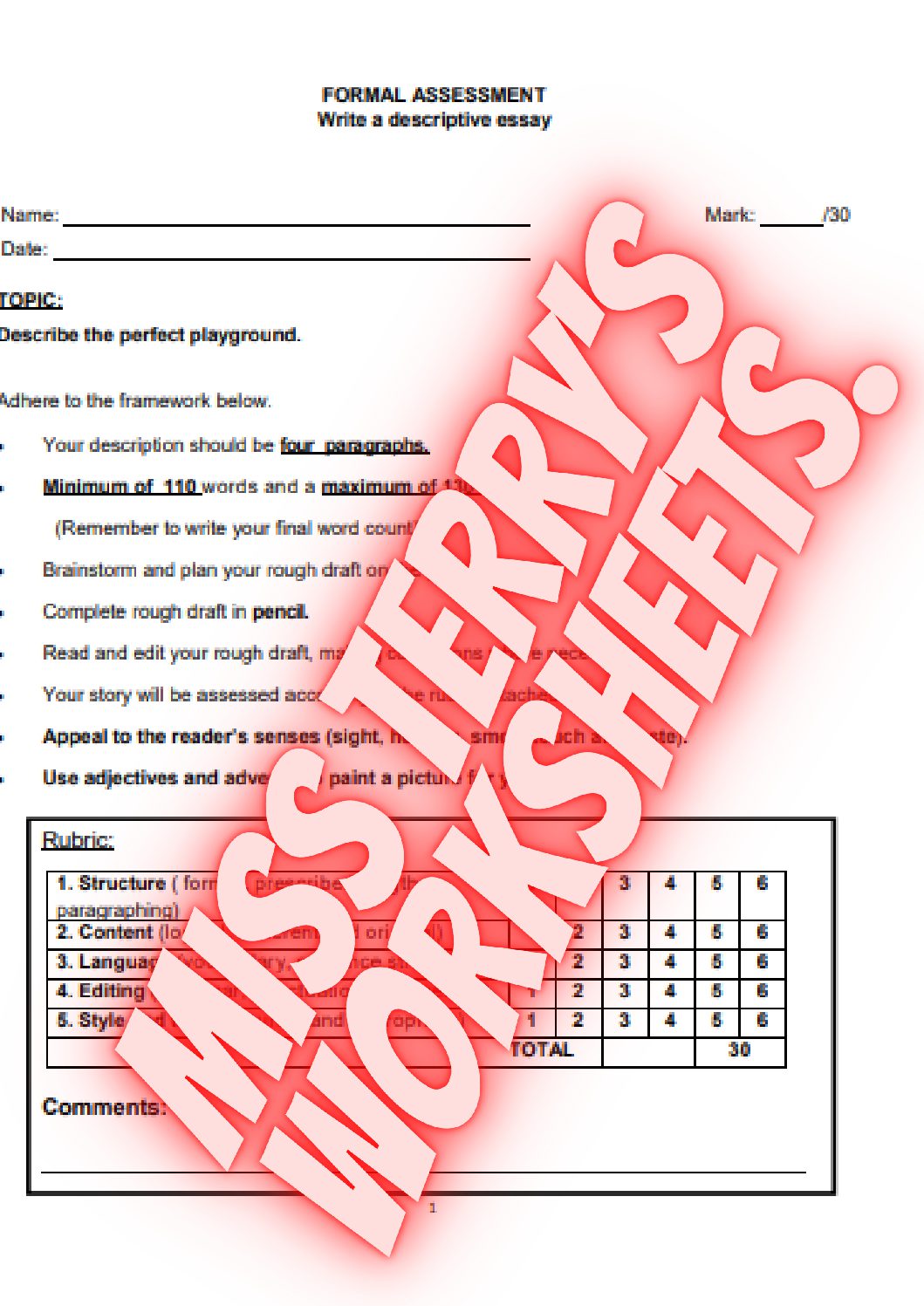
Formal assessment for grade 5 First Additional Language English. Learners write a descriptive essay on the perfect playground.
In this formal assessment a rubric is added for a mark out of 30. This assessment also contains: – A mind map with prompts to help learners brain storm. – A first draft with guidelines on what should be written in which paragraph. – A checklist to help learners edit and revise. – A final draft layout.
R 34.50
Share this resource
Use, by you or one client, in a single end product which end users are not charged for. The total price includes the item price and a buyer fee.
Resource Description
Resource reviews.
Store reviews: ( 1 rating )
Related Resources
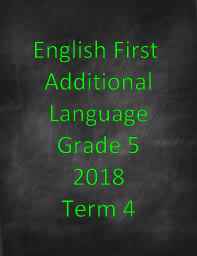
English FAL Grade 5 Term 4 2018 Task 1.3 Language Structures & Conventions
ARCAssessments - Teacher 911
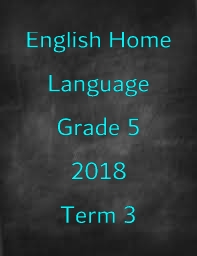
English HL Grade 5 Term 3 2018 Task 1.5 Writing

English FAL Grade 5 Term 3 2019 Task 1.2 Reads Aloud
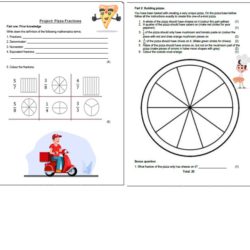
Gr. 5 Mathematics – Project – Term 3 – 2022 – English
Teacher C Recourses

English FAL Grade 5 Term 3 2021 Task 7 Oral Presentation of Project (Task 6)

Grade 5 FAL – Collective nouns
English Boffin
More from this seller
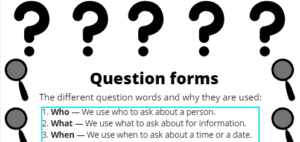
Question forms and Narrative writing
Miss Terry's worksheets!
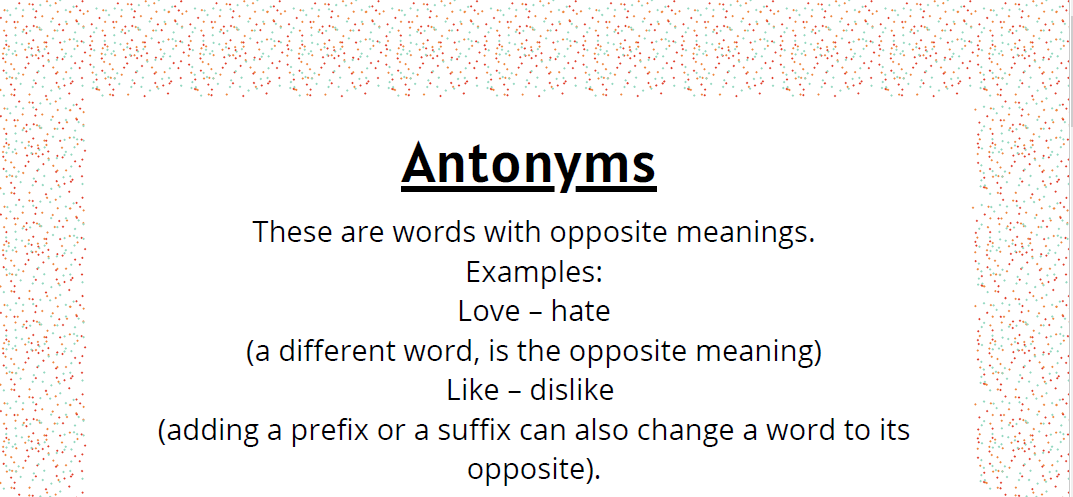
Antonyms – Memo included
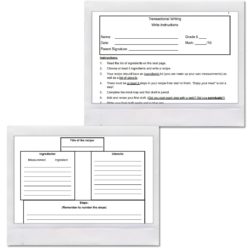
Formal assessment – TRANSACTIONAL WRITING GRADE 5 English FAL
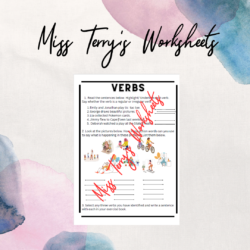
Regular and irregular verb Worksheet
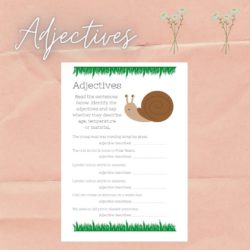
Adjectives worksheet (MEMO INCLUDED)
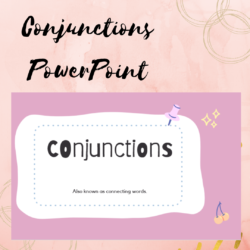
Conjunctions – PowerPoint


IMAGES
VIDEO
COMMENTS
This format has 5 paragraphs in total. The sequence of the paragraphs is as follows; Introduction. Body Paragraph 1. Body Paragraph 2. Body Paragraph 3. Conclusion. Following is an example of a descriptive essay written using the famous 5 paragraph method. 5 Paragraph Descriptive Essay.
GRADE 5 EFAL DESCRIPTIVE ESSAY WRITING EXEMPLAR.pdf. GRADE 5 EFAL DESCRIPTIVE ESSAY WRITING EXEMPLAR.pdf — 114 KB.
This ideal Grade 4 and Grade 5 English term 1 resource consists of four activities that help the learner to write a descriptive paragraph in English. The resource can be used in the Intermediate Phase to prepare the learner and give ideas about what to write in a descriptive paragraph. It is ideal for practise before assessment takes place and helps build on essay writing. This is a fantastic ...
A descriptive essay is a type of writing that aims to describe and portray an object, person, or place. The essay typically includes sensory details to help the reader imagine its contents more vividly. Descriptive essays can be written about a person, place, or other themes like nature, autumn, food, or even yourself.
Like every essay sample, a descriptive essay has an outline and format. The essay follows the traditional essay structure and includes: 1. An Introductory Paragraph. The first paragraph of an essay is the introduction and it usually sets the mood for the entire essay. A good descriptive essay has a strong opening.
Tips for writing descriptively. The key to writing an effective descriptive essay is to find ways of bringing your subject to life for the reader. You're not limited to providing a literal description as you would be in more formal essay types. Make use of figurative language, sensory details, and strong word choices to create a memorable ...
Must-have graphic organizer for middle-school writing lessons! Use this printable to teach your students how to write descriptions using descriptive paragraphs. A sample and blank description web, as well as, four different revisions of a descriptive paragraph are provided. Incorporate this writing printable into your class lesson or as ...
Here are some routines and structures for teaching descriptive writing: The RAFT strategy encourages descriptive writing and supports writing in general by encouraging students to think through the writer's Role, the Audience, the Format, and the Topic. ReadWriteThink offers this RAFT Writing Template.; This Sense Chart (opens in a new window) — organized into sight, sound, smell, taste ...
Once you have chosen your topic, draw five columns on a piece of paper or a word document on your computer. Then, label each column for the five senses, "touch," "sight," "sound," "taste," and "smell.". Write down as many details you can think of for the topic based on each sense.
A descriptive essay is a type of essay that involves describing a person, object, or any type of noun. We guide you through writing one with examples.
Descriptive essay example about a Place. "Even though monarchy is long gone, Buckingham Palace is here to remind us of the aesthetic beauty of that era.". Descriptive essay example about a Person. "One of the characteristics of Spider-Man is his youthfulness, and the fact that he talks to himself more than Hamlet.".
Descriptive writing uses details and the five senses to describe a person, place, thing, or event. Proper word choice and the use of adjectives are very important for the reader to create a picture in their mind. Similes and onomatopoeia (sound words) are some other examples of descriptive writing. Basic Sentence: The leaf fell off the tree.
The job of such an essay is to appeal to our senses in a way that it creates an image in our minds. Hence a descriptive essay plays with at least one of our five senses (touch, smell, taste, hearing, sight). In other words, the description of the person, place or thing in an essay should be really vivid. This means it after reading the essay ...
A descriptive essay is a type of writing that aims to vividly describe a person, place, object, or event. In this type of essay, the writer uses sensory details such as sight, sound, smell, taste, and touch to create a clear and vivid image in the reader's mind. The goal of a descriptive essay is to evoke a strong emotional response or create ...
The use of literary devices such as personification and metaphor makes the banyan tree in the second example come to life. This is how you can make your writing more vivid, descriptive, and poetic. 2. Use your senses. Sensory descriptors are one of the most important aspects of a descriptive essay.
A descriptive essay is a form of writing that employs vivid language and sensory details to create a vivid picture or experience for the reader. Unlike other types of essays that may focus on analyzing, persuading, or narrating, the primary goal of this type of an essay is to paint a compelling and detailed picture in the reader's mind.
A Descriptive Essay is a genre of essay writing that allows a writer to provide a vivid description of something- a person, an event, a place, a personal experience, an object, an emotion, etc. . Descriptive essays, like narrative essays, tend to allow the writer a great deal of artistic freedom than most academic writings. Good descriptive essays examples include newspaper articles, research ...
The way I encourage my students to write a five-paragraph descriptive essay is to choose three things to describe. For example, say that you are asked to write an essay describing the perfect bedroom. Pick three items to describe. You might choose to describe the furniture, wall hangings, and flooring. Then describe those three items using the ...
Descriptive Essay Topics: Place. Describe your favorite place. Describe your ideal bedroom. Describe the house in which you grew up. Describe what the first house on the moon would look like. Describe some of your favorite places in your hometown. Describe a peaceful place that you've visited. Describe a place that exists only in your ...
Essay on Discipline for Class 5. Essay on New Year Resolution for Class 5. Essay on Mahatma Gandhi for Class 5. Essay on Republic Day for Class 5. Happiest Day of My Life Essay for Class 5. My Birthday Party Essay for Class 5. Honesty is the Best Policy Essay for Class 5. Essay on Earthquake for Class 5.
3. Write a Thesis Statement. It is the most important part of any essay. When you are planning a descriptive essay, you need to come up with a strong thesis statement. A thesis statement is usually one or two sentences that explain the whole point of your essay to the reader. 4.
The Structure of a Descriptive Essay section from Writing a Descriptive Essay module from My Cyberwall (www.mycyberwall.co.za). ... 1 Grade 2 Grade 3 Grade 4 Grade 5 Grade 6 Grade 7 Grade 8 Grade 9 Grade 10 Grade 11 Grade 12 ...
Formal assessment for grade 5 First Additional Language English. Learners write a descriptive essay on the perfect playground. In this formal assessment a rubric is added for a mark out of 30. This assessment also contains: - A mind map with prompts to help learners brain storm. - A first draft with guidelines on what should be written in ...